Agenda for 50th GST Council Meeting 11th July 2023
Volume-III
GST Council Secretariat New Delhi
OFFICE MEMORANDUM
Subject: Notice for the 50th Meeting of the GST Council scheduled to be convened on 11th July, 2023.
The undersigned is directed to refer to the subject stated above and to convey that the 50th Meeting of the GST Council will be held on 11th July, 2023 at New Delhi. The schedule of the Meeting is as follows:
• Tuesday, 11th July, 2023: 11:00 A.M. onwards
2. In addition, an Officers’ Meeting will be held on 10th July, 2023 as per the following schedule:
• Monday, 10th July, 2023: 2: 00 P.M. onwards
3. The agenda items and other details for the 50th Meeting of the GST Council will be communicated in due course of time.
4. Keeping in view the logistical constraints, it is requested that participation from each State/UT may be kept limited to two (02) officers in addition to the Hon’ble Member of the GST Council.
5. Kindly convey the invitation to Hon’ble Member of the GST Council to attend the Meeting of the GST Council.
Sd/- (Sanjay Malhotra) Secretary to the Govt. of India and ex-officio Secretary to the GST Council Tel: 011 23092653
Copy to:
1. PS to the Hon’ble Minister of Finance, Government of India, North Block, New Delhi with the request to brief Hon’ble Minister about the above said meeting.
2. PS to the Hon’ble Minister of State (Finance), Government of India, North Block, New Delhi with the request to brief Hon’ble Minister about the above said meeting.
3. The Chief Secretaries of all the State Governments, Union Territories of Delhi, Puducherry and Jammu and Kashmir with the request to intimate the Minister in charge of Finance/Taxation or any other Minister nominated by the State Government as a Member of the GST Council about the above said meeting.
4. Chairman, CBIC, North Block, New Delhi, as a permanent invitee to the proceeding of the Council.
5. Chairman, GST Network.
TABLE OF CONTENTS
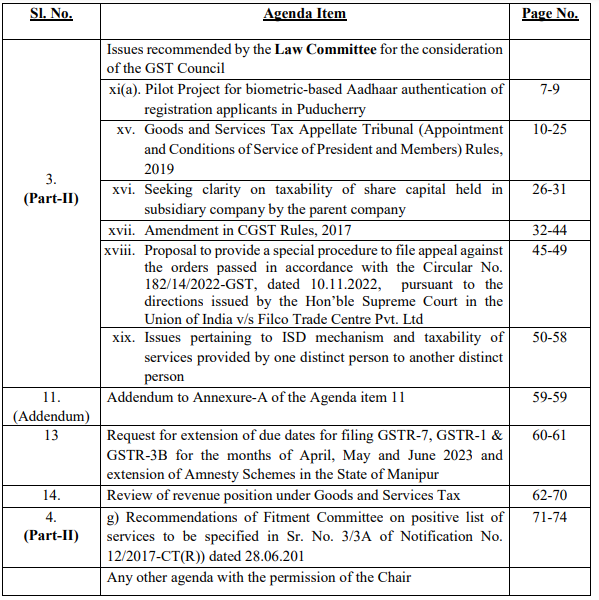
Agenda Item 3(xi)(a): Pilot Project for biometric-based Aadhaar authentication of registration applicants in Puducherry.
On the recommendations of the GST Council in its 48th meeting held on 17.12.2022, it was decided to conduct a pilot in the state of Gujarat for biometric-based Aadhaar authentication of highrisk registration applicants.
2. To this effect, –
(i) Amendments have been made in rule 8(4A), rule 8(5) and rule 9 have been made in the CGST Rules, 2017 as well as in the Gujarat SGST Rules, as below:
Rule 8(4A) of CGST Rules has been substituted vide notification no. 04/2023-Central Tax dated 31.03.2023 as under:
(4A) Where an applicant, other than a person notified under sub-section (6D) of section 25, opts for authentication of Aadhaar number, he shall, while submitting the application under sub-rule (4), undergo authentication of Aadhaar number and the date of submission of the application in such cases shall be the date of authentication of the Aadhaar number, or fifteen days from the submission of the application in Part B of FORM GST REG-01 under sub-rule (4), whichever is earlier.
Provided that every application made under sub-rule (4) by a person, other than a person notified under sub-section (6D) of section 25, who has opted for authentication of Aadhaar number and is identified on the common portal, based on data analysis and risk parameters, shall be followed by biometricbased Aadhaar authentication and taking photograph of the applicant where the applicant is an individual or of such individuals in relation to the applicant as notified under sub-section (6C) of section 25 where the applicant is not an individual, along with the verification of the original copy of the documents uploaded with the application in FORM GST REG-01 at one of the Facilitation Centres notified by the Commissioner for the purpose of this sub-rule and the application shall be deemed to be complete only after completion of the process laid down under this proviso.
rule 8(5) has been amended vide Notification No. 26/2022-CT dated 26.12.2022 as under: (5) On receipt of an application under sub-rule (4) or sub-rule (4A), as the case maybe, an acknowledgement shall be issued electronically to the applicant in FORM GST REG-02.
rule 9 has been amended vide Notification No. 26/2022-CT dated 26.12.2022 as under
(1) The application shall be forwarded to the proper officer who shall examine the application and the accompanying documents and if the same are found to be in order, approve the grant of registration to the applicant within a period of seven working days from the date of submission of the application:
Provided that where –
(a) a person, other than a person notified under sub-section (6D) of section 25, fails to undergo authentication of Aadhaar number as specified in sub-rule (4A) of rule 8 or does not opt for authentication of Aadhaar number; or
(aa) a person, who has undergone authentication of Aadhaar number as specified in sub-rule (4A) of rule 8, is identified on the common portal, based on data analysis and risk parameters, for carrying out physical verification of places of business; or;
(b) the proper officer, with the approval of an officer authorised by the Commissioner not below the rank of Assistant Commissioner, deems it fit to carry out physical verification of places of business, the registration shall be granted within thirty days of submission of application, after physical verification of the place of business in the presence of the said person, in the manner provided under rule 25 and verification of such documents as the proper officer may deem fit;
(2) Where the application submitted under rule 8 is found to be deficient, either in terms of any information or any document required to be furnished under the said rule, or where the proper officer requires any clarification with regard to any information provided in the application or documents furnished therewith, he may issue a notice to the applicant electronically in FORM GST REG-03 within a period of seven working days from the date of submission of the application and the applicant shall furnish such clarification, information or documents electronically, in FORM GST REG-04, within a period of seven working days from the date of the receipt of such notice.
Provided that where –
(a) a person, other than a person notified under sub-section (6D) of section 25, fails to undergo authentication of Aadhaar number as specified in sub-rule (4A) of rule 8 or does not opt for authentication of Aadhaar number; or
(aa) a person, who has undergone authentication of Aadhaar number as specified in sub-rule (4A) of rule 8, is identified on the common portal, based on data analysis and risk parameters, for carrying out physical verification of places of business; or
(b) the proper officer, with the approval of an officer authorised by the Commissioner not below the rank of Assistant Commissioner, deems it fit to carry out physical verification of places of business, the notice in FORM GST REG-03 may be issued not later than thirty days from the date of submission of the application.
…”
However, the said amendments have not been made in the SGST / UTGST Rules of other states/ UTs at present.
(ii) Further, rule 8(4B) has been introduced in CGST Rules only. Subsequently, Notification No. 27/2022-CT dated 26.12.2022 has been issued by the Centre under rule 8(4B) for specifying all states and UTs, except Gujarat, where provisions of rule 8(4A) will not apply.
3.1 Department of Revenue vide their email dated 27.06.2023 has informed that Puducherry has communicated their willingness to conduct pilot for biometric authentication of Aadhaar for high-risk registration applicants in their State also. In order to implement the said biometric-based Aadhaar authentication for registration applicants in Puducherry, the following notifications may be required to be issued:
(i) The State of Puducherry will need to substitute rule 8(4A) of Puducherry SGST Rules on the lines of corresponding substitution of Rule 8(4A) of CGST Rules vide notification no. 04/2023-Central Tax dated 31.03.2023;
(ii) Further, the State of Puducherry will also need to amend rule 8(5) and rule 9 of Puducherry SGST Rules on the lines of corresponding amendments in CGST rules notified vide notification no. 26/2022- CT dated 26.12.2022.
(iii) The Central government may also be required to further amend Notification No. 27/2022-CT dated 26.12.2022 for specifying that the proviso to rule 8(4A) will apply to the State of Puducherry as well.
3.2 Further, it is proposed that the Council may authorize the Chairperson to extend the said pilot project, if required, in other States and/ or Union territories which may be willing to conduct pilot for biometric authentication of Aadhaar for high-risk registration applicants.
4. It is further mentioned that the above amendments in sub-rule (5) of rule 8 and sub-rule (1) and
(2) of rule 9 of CGST Rules vide Notification No. 26/2022-CT dated 26.12.2022, as detailed in Para 2 above, have been made at present only in Gujarat SGST Rules and in CGST Rules but not in SGST Rules of other states. It is proposed to notify the said amendments in sub-rule (5) of rule 8 and sub-rule (1) and (2) of rule 9 in the SGST Rules of the remaining States as well to provide for enabling clause for mandatory physical verification of an applicant who has undergone authentication of Aadhaar and is identified on the common portal based on data analysis and risk parameters.
5. Therefore, the proposals at para 3.1, 3.2 and 4 are placed before the Council for approval
Agenda Item 3(xv): Goods and Services Tax Appellate Tribunal Appointment and Conditions of Service of President and Members) Rules, 2019
In 49th GST Council meeting held on 17th 18th February, 2023, the recommendation of the Group of Ministers (GoM) on the constitution of Goods and Services Tax Appellate Tribunal (GSTAT) was accepted by the Council. Accordingly, the law amendments in CGST Act, 2017 relating to the constitution of GST Appellate Tribunal have been incorporated through Finance Act, 2023 (vide clause 149 to154 of the Finance Act, 2023), by substitution of sections 109, 110 and 114 of CGST Act and by amending sections 117, 118 and 119 of CGST Act.
2. The said provisions of Finance Act, 2023 will be notified in due course in coordination with the states and Union territories once necessary amendments are made in the respective State/ UTGST Acts.
3. Meanwhile, it is proposed that Rules governing appointment and conditions of President and Members of the proposed GST Tribunal may be formulated for enabling smooth constitution and functioning of GST Tribunal. The said Rules may be notified after notification of the above provisions of the Finance Act, 2023.
3.1 The said issue was deliberated by the Law Committee in its meeting held on 31.05.2023. The Law Committee recommended the issuance of GSTAT (Appointment and Conditions of Service of President and Members) Rules, 2023. The draft GSTAT (Appointment and Conditions of Service of President and Members) Rules, 2023 as recommended by the Law Committee are enclosed as Annexure-A of this agenda note.
4. Accordingly, the same is placed before GST Council for deliberation and approval please.
Annexure-A
Draft Rules as per Finance Act, 2023
MINISTRY OF FINANCE
(Department of Revenue)NOTIFICATION
G.S.R. (E).— In exercise of the powers conferred by section 110 of the Central Goods And Services Tax Act, 2017 (12 of 2017) read with section 164 of the said Act, the Central Government, in super session of the Goods and Services Tax Appellate Tribunal (Appointment and Conditions of Service of President and Members) Rules, 2019, hereby makes the following rules, namely:-
CHAPTER I PRELIMINARY
1. Short title, commencement and application.—
(1) These rules may be called the Goods and Services Tax Appellate Tribunal (Appointment and Conditions of Service of President and Members) Rules, 2023.
(2) Save as provided in these rules, they shall come into force on the date of their publication in the Official Gazette.
(3) These rules shall apply to the President, Judicial Member, Technical Member (Centre) and Technical Member (State) of the Principal Bench and State Bench of Goods and Services Tax Appellate Tribunal.
2. Definitions.
In these rules, unless the context otherwise requires, —
(a) “Act” means the Central Goods And Services Tax Act, 2017 (12 of 2017);
(b) “Committee” means the Search-cum-Selection Committee constituted under clause (a) of sub-section 4 of section 110 of the Act for Technical Member (State) of the State Bench or the Search-cum-Selection Committee constituted under clause (b) of sub-section 4 of section 110 of the Act for President and other Members.
(c) “Form” means a Form appended to these rules;
(d) “Member” means a Technical Member (Centre) or Technical Member (State) or Judicial Member of the Goods and Services Tax Appellate Tribunal;
(e) “section” means a section of the Act;
(f) “Tribunal” means Goods and Services Tax Appellate Tribunal as established under section 109 of the Act.
CHAPTER II APPOINTMENT OF PRESIDENT AND MEMBER
3. Selection for posts of President and Members—
(1) The Committee shall determine its own procedure for making recommendation.
(2) The Committee may cause a vacancy circular to be issued through the Member Secretary, giving details of the posts of Members proposed to be filled up, including the following—
a. number of existing and anticipated vacancies;
b. qualifications;
c. salary and allowances;
d. format for application; and
e. last date for filing of applications,
in Form-I after making such modifications as may be deemed fit by the Committee.
(3) The Committee shall scrutinise, or cause to be scrutinised, every application received in response to the circular, against the qualifications and may shortlist such number of eligible candidates for personal interaction as it may deem fit.
(4) For the post of President, the Committee may, either cause a vacancy circular to be issued and call for applications or search for suitable persons eligible for appointment and make an assessment for selection to the post ofPresident.
(5) The Committee shall make its recommendations based on the overall assessment of eligible candidates including assessment through the personal interaction after taking into account the suitability, record of past performance, integrity as well as adjudicating experience keeping in view the requirements of the Tribunal and shall recommend a panel of two names for every post for which selection is being done in accordance with the provisions ofsub – section (6) of section 110 of the Act.
4. Selection for re – appointment.— (1) An application for re-appointment shall be considered in the same manner as that for the original appointment, preferably, along with all the persons shortlisted in response to the vacancy circular or otherwise.
(2) While making its assessment for suitability to a post, the Committee shall give additional weightage to the persons seeking re-appointment for their experience in the Tribunal and while doing so, shall take into account, the performance of the person while working as a President or Member in the Tribunal.
5. Medical fitness of President and Members.—
(1) No person shall be appointed as President, Judicial Member or Technical Member (Centre) of the Principal Bench or the State Bench of the Tribunal or as Technical Member (State) of the Principal Bench unless he is declared medically fit by an authority specified by the Central Government in this behalf.
(2) No person shall be appointed as Technical Member (State) of the State Bench of the Tribunal unless he is declared medically fit by an authority specified in this behalf by the State in which the said State Bench is located.
6. Retirement from parent service on appointment as President or Member.— (1) Where, the person appointed as President or Member is a serving Judge of the Supreme Court or a High Court or a serving Member of an organised Service, he shall either resign or obtain voluntary retirement before joining the Tribunal.
CHAPTER III RESIGNATION OR REMOVAL OF PRESIDENT OR MEMBER
7. Resignation.— President or Member may, by writing under his hand addressed to the Central Government, resign from his office at any time:
Provided that the President or Member shall, unless he is permitted by the Central Government to relinquish office sooner, continue to hold office until the expiry of three months from the date of receipt of such notice by the Government oruntil a person duly appointed as his successor enters upon his office or until the expiry of his term of office, whichever is earliest.
8. Procedure for inquiry into complaints.—
(1) Where a written complaint alleging any definite charge of the nature referred to in sub-section (12) of section 110 of the Act in respect of President or Member is received by the Central Government, it shall make a preliminary scrutiny of such complaint.
(2) Where, on preliminary scrutiny, the Central Government is of the opinion that there are reasonable grounds for making an inquiry into the truth of any allegation referred to in sub-rule (1), it shall make a reference to the concerned Committee.
(3) The said Committee shall conduct an inquiry or cause an inquiry to be conducted by a person who is, or has been, a –
(a) Judge of Supreme Court or Chief Justice of a High Court, where the inquiry is against President; or
(b) Judge of a High Court, where the inquiry is against a Member.
(4) The inquiry shall be completed within such time or such further time as may be specified by the Central Government preferably within six months.
(5) After the conclusion of the inquiry, the Committee shall submit its report to the Central Government stating therein its findings and the reasons thereof on each of the charges separately with such observations on the whole case as it may think fit.
(6) The Committee shall not be bound by the procedure laid down by the Code of Civil Procedure,1908 (5 of 1908) but shall be guided by the principles of natural justice and shall have power to regulate its own procedure, including the fixing of date, place and time of its inquiry.
CHAPTER IV SALARY AND ALLOWANCES
9. Salary. — (1) The President of the Tribunal shall, be paid a salary of Rs. two lakh fifty thousand (fixed) per month.
(2) The Member shall be paid a salary of Rs. two lakh twenty- five thousand per month.
(3) In case, a person appointed as the President, or Member, is in receipt of any pension, the pay of such person shall be reduced by the gross amount of pension drawn by him.
10. Allowances.— (1) The President and Members shall be entitled to draw allowances and benefits as areadmissible to a Government of India officer holding Group ‘A’ post carrying the same pay
(2) Notwithstanding anything contained in sub-rule (1), the President or Members shall have option to avail of accommodation to be provided by the Central Government as per the rules for the time being in force or shall be eligible for reimbursement of house rent subject to a limit of –
(a) one lakh fifty thousand rupees per month in case of President of the Tribunal; and
(b) one lakh twenty-five thousand rupees per month in case of Members of the Tribunal.
11. Transport allowance.— The President, or Members shall be entitled to the facility of staff car for journeys for official and private purposes in accordance with the facilities as are admissible to a Government of India officer holding Group ‘A’ post carrying the same pay as per the provisions of Staff Car Rules.
CHAPTER V PENSION, PROVIDENT FUND, GRATUITY AND LEAVE
12. Pension, Provident Fund and Gratuity.— Pension, Provident Fund and gratuity shall not be admissible for the service rendered in the Tribunal.
13. Leave. (1) The President or Member shall be entitled to thirty days of earned leave for every year of service.
(2) Casual Leave not exceeding eight days may be granted to the President or a Member in a calendar year.
(3) The payment of leave salary during leave shall be governed by rule 40 of the Central Civil Services (Leave) Rules, 1972.
(4) The President or Member shall be entitled to encashment of leave in respect of the earned Leave standing to his credit, subject to the condition that maximum leave encashment, including the amount received at the time of retirement from previous service shall not in any case exceed the prescribed limit under the Central Civil Service (Leave) Rules,1972.
(5) Leave sanctioning authority for-
(a) Member, shall be the President;
(b) President or Member in case of absence of President, shall be the Central Government.
(6) The Central Government shall be the sanctioning authority for foreign travel to the President and Members.
CHAPTER VI POWERS OF PRESIDENT AND VICE PRESIDENT
14. Powers of President.- The President shall exercise the powers of Head of the Department for the purpose of:-
(a) Delegation of Financial Power Rules, 1978;
(b) General Financial Rules, 2017; and
(c) Fundamental Rules and Supplementary Rules.
(d) CCS (CCA) Rules, 1965
15. Powers of Vice-President: – The Vice-President shall exercise the powers of the President provided under section 114 of the Act for the relevant State Benches for the purpose of:-
(a) Allocation of appeals amongst members within a bench under his jurisdiction.
(b) Deciding the appeals to be heard by Single Member as per provisions of the Act.
(c) Transfer of appeals amongst the State Benches within his jurisdiction.
(d) Refer cases under clause (a) of sub-section (9) of Section 109 of the Act to a Member in a State Bench within his jurisdiction.
(e) Such other administrative and financial powers as may be assigned by the President by a general or special order.
CHAPTER VII MISCELLANEOUS
16. Declaration of Financial and other Interests.— The President or the Member shall, before entering upon his office, declare his assets, and his liabilities and financial and other interests.
17. Other conditions of service.— (1)The terms and conditions of service of a President or Member with respect to which no express provision has been made in these rules, shall be such as are admissible to a Government of India officer holding Group ‘A’ post carrying the same pay.
(2) The President, or Member shall not undertake any arbitration assignment while functioning in these capacities in the Tribunals.
(3) The President, or Member of the Tribunal, shall not, for a period of two years from the date on which theycease to hold office, accept any employment in, or connected with the management or administration of, any person who has been a party to a proceeding before the Tribunal:
Provided that nothing contained in this rule shall apply to any employment under the Central Government or a State Government or a local authority or in any statutory authority or any corporation established by or under any Central, State or Provincial Act or a Government company as defined in clause (45) of section 2 of the Companies Act, 2013 (18 of 2013).
18. Oath of office and secrecy.— Every person appointed to be the President, or Member shall, before entering upon his office, make and subscribe an oath of office and secrecy in Form II and Form III annexed to these rules.
19. Power to relax:- Where the Central Government is of the opinion that it is necessary or expedient so to do, it may, on the recommendations of the Council, by order and for reasons to be recorded in writing, relax any of the provisions of these rules with respect to any class or category of persons.
20. Interpretation.- If any question arises relating to the interpretation of these rules, the decision of the Central Government thereon, on the recommendations of the Council shall be final.
FORM I
(See rule 3)
[Format for vacancy circular including the format for application]
F. No._.
Government of India
Ministry of ________
Department of ______. Room No.___.
New Delhi-110001
Dated,the ____
*****
Vacancy Circular
Subject: – Selection for the posts of President/Member in ……………………..Tribunal-reg.
*****
1. Tribunal: – The Goods and Services Tax Appellate Tribunal is an Appellate Authority established under ______________ the Central Goods And Services Tax Act, 2017 to hear various appeals under the ________ Act, ___.Principal Bench is situated at New Delhi ____________________ and its state Benches are situated at _________________.A Member, upon selection, may be posted at any of these places.
2. Vacancy: – Applications are being invited for the following existing and________ anticipated vacancies:

3. Qualification:- The qualifications, eligibility, salary and other terms and conditions of the appointment of a candidate will be governed by the provisions of the of Central Goods And Services Tax Act, 2017 and Goods and Services Tax Appellate Tribunal (Appointment and Conditions of Service of President and Members) Rules, 2023.
4. Procedure for selection: – The Search-Cum-Selection Committee constituted under the clause (a) of sub-section 4 of section 110 for the posts of Technical Member (State) of the State Bench and under clause (b) of sub-section (4) of the said section of Central Goods And Services Tax Act, 2017 for the posts of President and other Members shall recommend names for appointment to the said post/s and shall scrutinise the applications with respect to suitability of application for the posts by giving due weightage to qualification and experience of candidates and shortlist candidates for conducting personal interaction. The final selection will be done on the basis of overall evaluation of candidates done by the Committee based on the qualification, experience and personal interaction.
5. Application Procedure:- Applications by eligible and willing officers are to be submitted through proper channel(wherever applicable) and should be accompanied with (i) bio-data in the proforma at Annexure-I (ii) Certificate to be furnished by the employer/ head of office/ forwarding authority as in Annexure-II (iii) clear photocopies of the up-to-date CR/APAR dossier of the officer containing CR/APARs of at least last five years duly attested by a Group A officer (iv) cadre clearance (v) integrity certificate/clearance from vigilance and disciplinary angle as in Annexure-III (vi) statement giving details of major or minor penalties, if any, imposed on the officer during the last ten years, to the following address, so as to reach this office latest by ________:-
[Name and Address]
Applicants can Log on to https://. to access the home page of the Online Application to apply (wherever applicable).
6. No TA/DA will be admissible to the candidates to be called for interview/interaction. The candidates are required to make own arrangements.
7. Advertisement and Prescribed application form can be downloaded from Ministry’s/Tribunals website (name of the website).
8. Any application received after due date or without necessary Annexure as mentioned above will not be entertained.
Wide publicity may be given in all organizations and their field formations to facilitate early and optimum number of application.
(Name of the Signing Officer) Under Secretary to the Govt. of India/Director
Annexure-I
PROFORMA

1. Name :
2. Date of Birth :
3. Category (SC/ST/OBC/UR) :
4. Designation/Profession :
5. Contact Details :
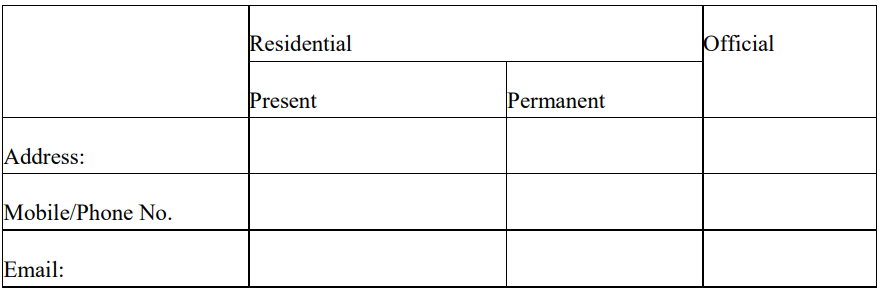
6. Cadre/Service [Wherever applicable] :
7. Educational qualification (in reverse chronological order):
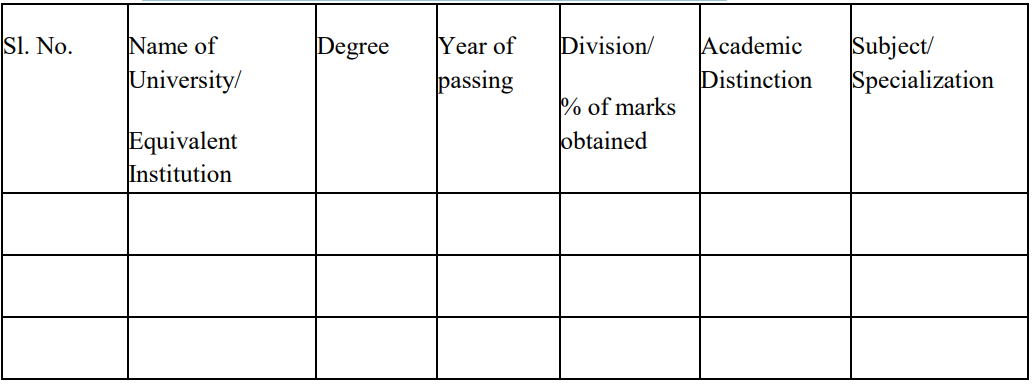
8. Work Experience:
8 A. For the experience as employee, Employment record in chronological order starting with present Employment, list in reverse:
(a) For the post of Technical Member (Centre) and Technical Member (State) .

* Please specify whether the said work involves administration of an existing law (as defined in clause (48) of section (2) of the Central Goods and Services Tax Act, 2017) or the goods and services tax in the Central Government in respect of post of Technical Member (Centre) or whether the work involves administration of an existing law or the goods and services tax or in the field of finance and taxation in the State Government in respect of post of Technical Member (State).
Also specify whether the said works involves judicial/ quasi-judicial functions.
(b) For the post of President and Judicial Member

. Please specify whether the said work involves Judicial or Quasi-Judicial /Criminal/Civil /Taxation /Company Affairs/or any other as may be applicable.
9. Write up on adjudicating experience :
of the applicant (200 words)
[Wherever applicable]
10. Mention :
a. Whether minimum three years of experience is there : (Yes/No. If yes, provide details thereof )
in the administration of an existing law or goods and
services tax in the Central Government for the post of
Technical Member (Centre)
b.Whether minimum three years of experience is there : (Yes/No. If yes, provide details thereof )
in the administration of an existing law or goods and
services tax or in the field of finance and taxation
in the State Government for the post of
Technical Member (State)
c. Any experience in handling such cases involving : (Brief Writeup)
interpretation of goods and services tax law or an
existing law for the posts of Judicial Member
12. Write up on 05, major achievement : (200 words each)
13. Awards/honours/Publications, if any :
14. Affiliation with the professional bodies/ :
Institutions/societies/or any other body
Including political party.
15. Additional information, if any, which :
You would like to mention in support of the application for the post.
DECLARATION
1. I certify that the foregoing information is correct and complete to the best of knowledge and belief and nothing has been concealed/distorted. If at any time I found to have concealed/distorted any material information; my appointment shall be liable to summary termination without notice.
2. I shall not withdraw my candidature after the meeting of the Selection Committee.
3. I shall not decline the appointment, if selected for appointment by the ACC.
4. I shall join within 30 days from the date of issue of order of appointment.
5. I am aware that in case I violate any of the conditions mentioned at SI.No.2 to 4, the Government of India is likely to debar me for a period of three years for consideration for appointment outside the cadre and in any Autonomous Body/Statutory Body/Regulatory Body.
Place : Date:
Signature of the candidate
Annexure- II
CERTIFICATE TO BE FURNISHED BY THE EMPLOYER/HEAD OF OFFICE/FORWARDING AUTHOTITY
1. Certified that the particular furnished by Shri/Smt/Kum are correct and he/she possesses educational qualifications and experience mentioned in Annexure-I.
2. It is also certified that there is no vigilance/ disciplinary case either pending or being contemplated against him/her and vigilance clearance issued by competent Authority in the enclosed Annexure (III).
3. His/her integrity is certified.
4. No major or minor penalty was imposed on Shri/Smt/Kum during the last 10 years period.
5. The up-to-date attested Photostate copies of ACR/APAR of last 5years (each Photostat copy of ACR/APAR should be attested) in respect of Shri/Smt/Kum————————————————– are enclosed herewith.
Seal & Signature of the cadre controlling Authority
Annexure-III
PARTICULARS OF THE OFFICERS FOR WHOM VIGILANCE CLEARANCE IS BEING SOUGHT
(To be furnished and signed by the competent authority or HOD)
1. Name of the Officer (in full) :
2. Father’s name :
3. Date of Birth :
4. Date of Retirement :
5. Date of entry into service
6. Service to which the officer belongs :
including batch /year/ cadre etc. ,
wherever applicable
7. Positions held (During ten preceding years):

8. Whether the officer has been placed on :
the agreed list or list of Officer of
Doubtful Integrity (if yes, details to be given)
9. Whether any allegation of misconduct :
Involving vigilance angle was examined against
the officer during the last 10 Years and if so with what result (*)
10. Whether any punishment was awarded to :
the officer during the last 10 years and if
so, the date of imposition and details of penalty (*)
11. Is any disciplinary/ criminal proceedings :
or charge sheet pending against the
officer as on date (if so, details to be furnished)
12. Is any action contemplated against the :
Officer as on date (if so, details to be furnished (*)
(*) If vigilance clearance had been obtained in the past, the information may be provided for the period thereafter,
Date:
(NAME AND SIGNATURE)
FORM II
(See rule 17)
Form of Oath of Office for President/ Member
I, A. B., having been appointed as President/Member of the Goods and Service Tax Appellate Tribunal, do solemnly affirm/do swear inthe name of God that I will faithfully and conscientiously discharge my duties as the President/ Member of the Appellate Tribunal to the best of my ability, knowledge and judgment, without fear or favour, affection or ill-will.
FORM III
(See rule 17)
Form of Oath of Secrecy for President/Member
I, A. B., having been appointed as the President/Member of the Goods and Service Tax Appellate Tribunal, do solemnly affirm/do swear in the name of God that I will not directly or indirectly communicate or reveal to any person or persons any matter which shall be brought under my consideration or shall become known to me as President/ Member of the Appellate Tribunal except as may be required for the due discharge of my duties as the President/Member.
Agenda Item 3(xvi): Seeking clarity on tax ability of share capital held in subsidiary company by the parent company
Representation has been received from trade to clarify whether the holding of shares in a subsidiary company by the parent company will be treated as ‘supply of service’ under GST and will be taxed accordingly or whether such transaction is not a supply.
2. Some of the field formations/ investigative agencies are relying on the SAC code 997171- “services provided by holding companies, i.e. holding securities of (or other equity interests in) companies and enterprises for the purpose of owning a controlling interest”, and are demanding GST on “share capital held in subsidiary company’ under forward charge basis and on ‘share capital held by a foreign holding company’, on reverse charge basis by classifying the said activity as an import of service by invoking residual entry 15 of Notification 11/2017 CGST (rate). They have taken a view that equity capital is to be treated as a financial asset which is in the form of an investment made with a purpose to have control over the subsidiary company. Therefore, it is being claimed that the activity of holding securities is nothing but an investment made by holding company to have control over subsidiary company and therefore, it is a supply of “services of holding securities in subsidiary company” by the holding company to the subsidiary company.
3. Trade, on the other hand, has represented that a subsidiary company is controlled by the holding company by holding equity shares to protect the interests of the parent/ holding company and to regulate the capital infused by them. Such a control is not exercised with an intention to benefit the subsidiary company. It has also been represented that mere controlling interest does not qualify the said activity to be termed as a taxable ‘supply of service’ as per the SAC code 997171 and therefore, merely by holding equity shares in a subsidiary company, the parent company cannot be said to be rendering to the subsidiary company.
4. RELEVANT GST PROVISIONS:
4.1 Various definitions in CGST Act, 2017 to be referred in the Agenda Note are detailed below:
• Section 2(52) ” “goods” means every kind of movable property other than money and securities but includes actionable claim, growing crops, grass and things attached to or forming part of the land which are agreed to be severed before supply or under a contract of supply;”
• Section 2(102) “services” means anything other than goods, money and securities but includes activities relating to the use of money or its conversion by cash or by any other mode, from one form, currency or denomination, to another form, currency or denomination for which a separate consideration is charged;
[Explanation.- For the removal of doubts, it is hereby clarified that the expression “services” includes facilitating or arranging transactions in securities;]
• “ Section 7. Scope of supply.-
(1) For the purposes of this Act, the expression – “supply” includes-
(a) all forms of supply of goods or services or both such as sale, transfer, barter, exchange, licence,rental, lease or disposal made or agreed to be made for a consideration by a person in the course or furtherance of business,
[(aa) the activities or transactions, by a person, other than an individual, to its members or constituents or vice-versa, for cash, deferred payment or other valuable consideration.
Explanation .- For the purposes of this clause, it is hereby clarified that, notwithstanding anything contained in any other law for the time being in force or any judgment, decree or order of any Court, tribunal or authority, the person and its members or constituents shall be deemed to be two separate persons and the supply of activities or transactions inter se shall be deemed to take place from one such person to another;]
(b) import of services for a consideration whether or not in the course or furtherance of business; and
(c) the activities specified in Schedule I, made or agreed to be made without a consideration;
(d)[****].
[(1A) where certain activities or transactions constitute a supply in accordance with the provisions of sub-section (1), they shall be treated either as supply of goods or supply of services as referred to in Schedule II.]
(2) Notwithstanding anything contained in sub-section (1),-
(a) activities or transactions specified in Schedule III; or
(b) such activities or transactions undertaken by the Central Government, a State Government or any local authority in which they are engaged as public authorities, as may be notified by the Government on the recommendations of the Council,
shall be treated neither as a supply of goods nor a supply of services.
(3) Subject to the provisions of sub-sections (1), (1A) and (2), the Government may, on the recommendations of the Council, specify, by notification, the transactions that are to be treated as – (a) a supply of goods and not as a supply of services; or (b) a supply of services and not as a supply of goods.”
4.2 Definition of securities under clause (h) of section 2 of Securities Contracts (Regulation) Act, 1956 is as below:
“securities” include— (i) shares, scrips, stocks, bonds, debentures, debenture stock or other marketable securities of a like nature in or of any incorporated company or other body corporate; …………………………………”
4.3 Further, subsidiary company has been defined in sub-section 87 of section 2 of Companies Act, 2013. The same is reproduced below for reference:
“subsidiary company” or “subsidiary”, in relation to any other company (that is to say the holding company), means a company in which the holding company— (i) controls the composition of the Board of Directors; or
(ii) exercises or controls more than one-half of the total share capital either at its own or together with one or more of its subsidiary companies:
Provided that such class or classes of holding companies as may be prescribed shall not have layers of subsidiaries beyond such numbers as may be prescribed.
Explanation.—For the purposes of this clause,—
(a) a company shall be deemed to be a subsidiary company of the holding company even if the control referred to in sub-clause (i) or sub-clause (ii) is of another subsidiary company of the holding company;
(b) the composition of a company‘s Board of Directors shall be deemed to be controlled by another company if that other company by exercise of some power exercisable by it at its discretion can appoint or remove all or a majority of the directors;
(c) the expression “company” includes any body corporate; (d)”layer” in relation to a holding company means its subsidiary or subsidiaries;”
5. Analysis of the Issue:
5.1 Under GST law, supply is the relevant taxable event for levying tax. For an activity/transaction to be liable to GST, existence of ‘supply’ as defined under section 7 of CGST Act, 2017 should be there.
5.2 Section 7 of CGST Act, 2017 defines supply to mean ‘all forms of supply of goods or services or both made or agreed to be made for a consideration by a person in the course or furtherance of business.’ Therefore, it needs to be established that the activity which is to be considered as a supply must be done in course or furtherance of business and there should be a consideration made for the same. Further, Schedule I lists certain activities which are to be treated as a supply even if they are made without any consideration. Entry 2 of Schedule I of CGST Act, 2017 mentions supply of goods or services or both between related persons or distinct persons as a supply even if the same is made without any consideration. Further, Entry 4 of the said Schedule deems import of service by a person from a related person/ company or any of his other establishments outside India as an import of service even if rendered without any consideration, if the said transaction is in course or furtherance of business.
5.3 Further, securities under GST Law is considered neither goods nor services in terms of definition of goods under clause (52) of section 2 of CGST Act, 2017 and in terms of definitions of services under clause (102) of the said section. Further, securities include ‘shares’ as per definition of securities under clause (h) of section 2 of Securities Contracts (Regulation) Act, 1956.
5.4 This implies that the securities held by the holding company in the subsidiary company are neither goods nor services. Further, purchase or sale of securities in itself is neither a supply of goods nor a supply of services. However, as per Explanation to definition of services “under clause 102 of section 2 of CGST Act”, facilitating or arranging transactions in securities may be treated as supply of services. Similarly, activity of lending securities where it provides the right of ownership to third party on payment of certain consideration can be treated as a supply of services. However, purchase and holding of securities/share of the subsidiary company does not in itself constitute a supply of services. Further, mere holding majority shares by holding company of a subsidiary company does not in itself imply that a service is being provided by the holding company to the subsidiary company, solely on the basis that there is a SAC entry ‘997171’ in the scheme of classification of services mentioning; “the services provided by holding companies, i.e. holding securities of (or other equity interests in) companies and enterprises for the purpose of owning a controlling interest.”
5.5 For a transaction/activity to be treated as supply of services there must be a supply as defined under section 7 of CGST Act. Further, if a view is taken that holding shares by a company in its subsidiary company constitutes supply of services, as SAC entry 997171 mentions, then it will also emerge as to whether holding shares of any company even without holding a majority shares will also be considered as supply of services, as nature of transaction essentially remains the same. If such a view is taken then, in effect, every purchase of securities will be deemed as supply of services as every such purchase will lead to holding of securities of the said company by the purchaser. This may be in contradiction with the definition of supply under section 7 of CGST Act read with section 2 of the said Act in terms of definition of goods under clause (52) and definition of services under clause (102) of the said section and therefore will not be tenable.
5.6 Therefore, it appears from the above provisions that the holding of shares in a company per se cannot be treated as a supply of services by a holding company to its subsidiary company.
6. Law Committee deliberated on the issue in its meeting held on 28.06.2023 and recommended that the issue may be clarified through a circular, specifying that mere holding of securities of a subsidiary company by a holding company, whether located in India or abroad, cannot be treated as a supply of services and therefore cannot be taxed under GST.
7. The draft circular in this regard as recommended by Law Committee is enclosed at Annexure A to this agenda note.
8. Accordingly, the Agenda is placed before the GST Council for deliberation and approval.
******
ANNEXURE-A DRAFT Circular No. XX/XX/2023-GST
F. No. CBIC-20001/2/2022 – GST
Government of India
Ministry of Finance (Department of Revenue) Central Board of Indirect Taxes and Customs GST Policy Wing
*****
New Delhi, Dated the XXXXXX, 2023
To,
The Principal Chief Commissioners/ Chief Commissioners/ Principal Commissioners/ Commissioners of Central Tax (All) The Principal Directors General/ Directors General (All) Madam/Sir,
Subject: Clarification on various issues pertaining to GST-reg.
Representations have been received from the trade and field formations seeking clarification on certain issues whether the holding of shares in a subsidiary company by the holding company will be treated as ‘supply of service’ under GST and will be taxed accordingly or whether such transaction is not a supply.
2. In order to clarify the issue and to ensure uniformity in the implementation of the provisions of law across the field formations, the Board, in exercise of its powers conferred by section 168 (1) of the Central Goods and Services Tax Act, 2017 (hereinafter referred to as “CGST Act”), hereby clarifies the issues as under:
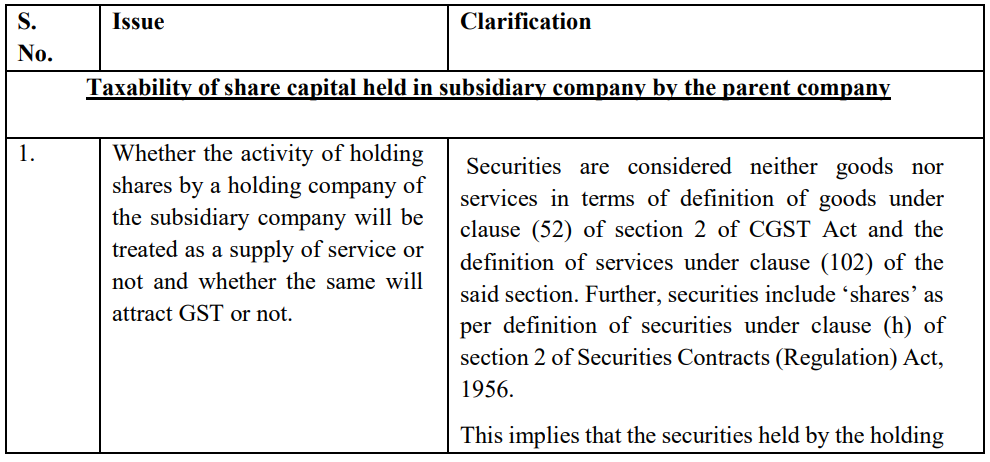
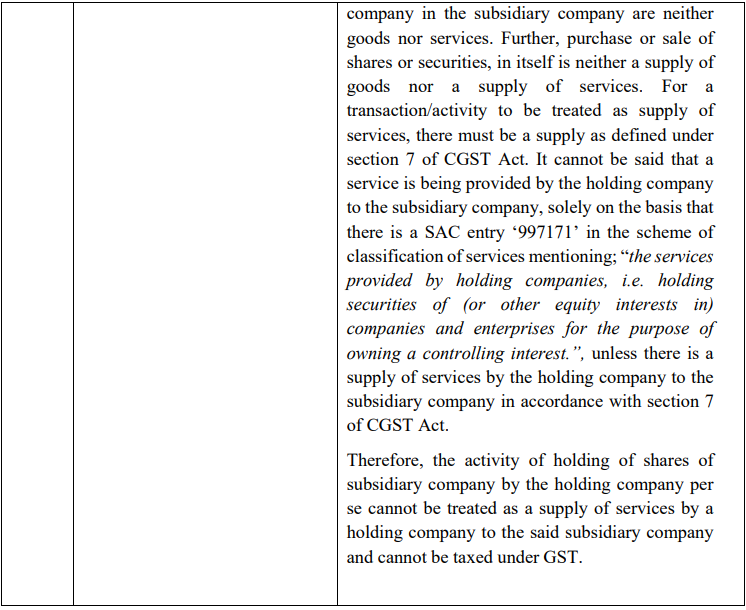
2. It is requested that suitable trade notices may be issued to publicize the contents of this Circular.
3. Difficulty, if any, in implementation of this Circular may please be brought to the notice of the Board. Hindi version would follow.
(Sanjay Mangal) Principal Commissioner (GST)
Agenda Item 3(xvii): Amendment in CGST Rules, 2017
Law Committee, in its various meetings, has deliberated upon several issues and has recommended changes in some of the provisions of the Central Goods and Services Tax Rules, 2017 (hereinafter referred to as “the CGST Rules”). In addition to the changes in the provisions of the CGST Rules, some changes in the FORMS under CGST Rules have also been recommended by the Law Committee. These changes are discussed below:
1. Omission of clause (c) of Explanation (1) to Rule 43
1.1 As per Sr. No 19B of Exemption Notification No. 12/2017 Central Tax (Rate) dated 28th June 2017, as amended from time to time, services by way of transportation of goods by a vessel from customs station of clearance in India to a place outside India was an exempt supply till 30.09.2022. Relevant extract of the said entry in the notification for ease of reference is as under –

1.2 However, this exemption has not been extended after 30.09.2022. As a result, the said service has become taxable after 30.09.2022. Normally, in the case when outward supply is exempt, the supplier needs to reverse the common ITC in accordance with rule 42 or rule 43 of CGST Rules. Since, the above service is not an exempt supply w.e.f 01.10.2022, reversal of ITC in respect of supply of the said services is not required w.e.f. 01.10.2022. Further, there are certain exclusion in the Explanation to Rule 43 of CGST Rules like the above mentioned services whose value of supply was excluded from the value of exempt supplies.
1.3 The Clause (c) of Explanation 1 to Rule 43 of CGST Rules is reproduced as under:
Explanation 1: -For the purposes of Rule 42 and this Rule, it is hereby clarified that the ggregate value of exempt supplies shall exclude:- (c) the value of supply of services by way of transportation of goods by a vessel from the customs station of clearance in India to a place outside India.
1.4 Consequent to lapsing of the exemption given vide Entry No. 19B of Exemption Notification No. 12/2017 Central Tax (Rate) dated 28th June 2017, there is a need to omit the said clause (c) of Explanation to Rule 43 of CGST Rules, as supply of aforementioned services is not an exempt supply with effect from 1st October 2022.
1.5 In view of the above, the Law Committee in its meeting held on 10.04.2023 and 11.04.2023 recommended that clause (c) of Explanation (1) at the end of Rule 43 of CGST Rules may be omitted.
II. Amendment in proviso to rule 46(f)
2.1 As per the recommendations of GST Council in its 48th meeting, rule 46 of CGST Rules has been amended vide Notification No. 26/2022 –Central Tax dated 26.12.2022 by adding a proviso to clause (f) of the said rule to provide that where any taxable services is supplied by or through an electronic commerce operator or by a supplier of online information and database access or retrieval services to a recipient who is un-registered, irrespective of the value of such supply, a tax invoice issued by the registered person shall contain the name and address of the recipient along with its PIN code and the name of the State of the recipient and the said State address shall be deemed to be the address on record of the recipient.
2.2 However, subsequent to the said amendment, concerns were received from some tax administrations that there may be cases where the supplier may have the information about the State name of the recipient, but may not have the full address and the PIN code of the recipient. In such cases, there may be a possibility that the supplier may declare the place of supply as his own location, due to non-availability of the full address details of recipient. This may lead to loss of revenue for the consumption states. Besides, representations have also been received from some sections of the industry mentioning that in certain services sector, exact address of the recipient may not be feasible for the supplier to be collected due to peculiar nature of the supply, and only name of the State of the recipient may be collected and recorded. Accordingly, request has been made to not insist of full address details of the recipient and only the name of State of the recipient may be sufficient to be provided in the tax invoice.
2.3 The matter was deliberated by the Law Committee in its meeting held on 10.04.2023 & 11.04.2023. Law Committee recommended that proviso to rule 46(f) of CGST Rules may be amended to provide that the tax invoice shall contain the name of the State of the recipient and the name and address of the recipient along with its PIN code may not be mandatory to be declared on the tax invoice. Further, the State of the recipient shall be deemed to be the address on record of the recipient. Accordingly, the Law Committee recommended the following amendment in proviso to rule 46(f) pf CGST Rules, as shown, in red color:

III. Amendment in rule 64 and FORM GSTR-5A
3.1 FORM GSTR-5A presently covers details of supplies of online information and database access or retrieval (OIDAR) services by a person located outside India made to non-taxable persons in India. The said form does not cover the details of supplies of online information and database access or retrieval services by a person located outside India made to a registered person in India. A registered person other than non-taxable online recipient located in India receiving online information and database access or retrieval services from a person located outside India is required to pay tax on such receipt of services on reverse charge basis as per Notification No. 10/2017-Integrated Tax (Rate) dated 28.06.2017. It is suggested that if the details of supplies made by the said OIDAR service provider to registered persons in India other than non-taxable online recipient can also be captured in FORM GSTR-5A, it can help in ensuring tax compliance by the said registered persons paying tax on reverse charge basis. Accordingly, it is proposed that format of FORM GSTR-5A be modified so as to also include details of supplies made by the OIDAR service provider located outside India to registered persons other than non-taxable online recipient in India.
3.2 Rule 64 of CGST Rules provides that every registered person providing online information and data base access or retrieval services from a place outside India to a person in India other than a registered person shall file return in FORM GSTR-5A on or before the twentieth day of the month succeeding the calendar month or part thereof. Since the proposed FORM GSTR-5A will also include details of supplies made by OIDAR services provider to registered persons in India, amendment is required in the said rule so as to prescribe that every registered person providing online information and data base access or retrieval services from a place outside India to non-taxable online recipient or to a registered person(other than a non-taxable online recipient) in India shall file return in FORM GSTR-5A.
3.3 Accordingly, Law Committee in its meeting held on 10.04.2023 & 11.04.2023 and 28.06.2023 has recommended amendment in rule 64 and in FORM GSTR-5A so as to also include details of supplies made by the OIDAR service provider located outside India to registered persons other than non-taxable online recipient in India. The proposed amendment in rule 64 and FORM GSTR-5A is shown, in red color, as below:

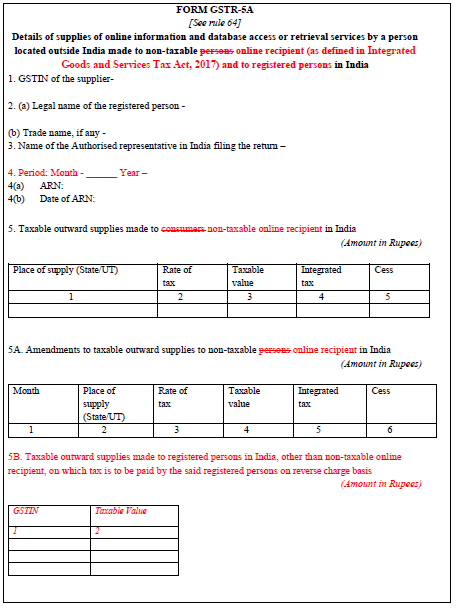
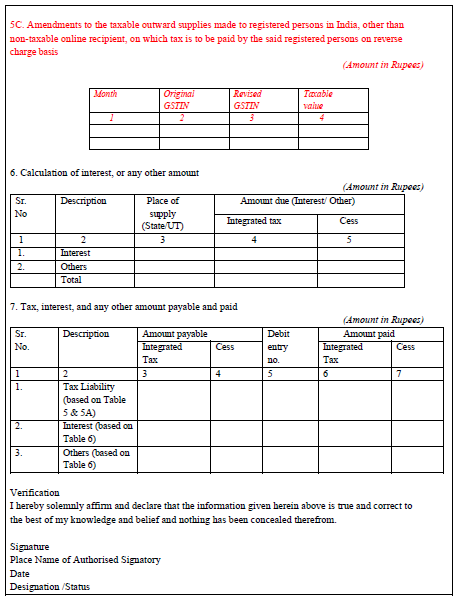
IV. Amendment in Rule 89(1):
4.1 Sub-rule (1) of rule 89 of the CGST Rules prescribes the manner of filing of Refund application for claiming refund of any balance in the electronic cash ledger in accordance with the provisions of sub-section (6) of section 49 or any tax, interest, penalty, fees or any other amount paid by a person, other than refund of integrated tax paid on goods exported out of India.
4.2 3rd proviso to sub-rule (1) of rule 89 provides that refund of any amount, after adjusting the tax payable by the applicant out of the advance tax deposited by him under section 27 of CGST Act, 2017 at the time of registration, shall be claimed in the last return required to be furnished by him. However, the Form GSTR- 3B for return does not provide any option for claiming refund.
4.3 In this regard, reference is drawn to section 24 of CGST Act, 2017 which specifies that casual taxable persons and Non-resident taxable persons who are making taxable supply are required to take compulsory registration. Sub-section (2) of section 27 of the Act ibid specifies that a casual taxable person or a non-resident taxable person shall, at the time of submission of application for registration under sub-section (1) of section 25 of CGST Act, 2017, make an advance deposit of tax in an amount equivalent to the estimated tax liability of such person for the period for which the registration is sought. Sub-section (3) of section 27 of CGST Act, 2017 states that the advance tax amount deposited shall be credited to the electronic cash ledger of such person and shall be utilized in the manner provided under section 49 of CGST Act, 2017. Further, Sub-section (6) of Section 49 of the CGST Act, 2017 specifies that the balance in the electronic cash ledger or electronic credit ledger after payment of tax, interest, penalty, fee or any other amount payable under this Act or the Rules made thereunder may be refunded in accordance with the provisions of section 54 of CGST Act, 2017.
4.4 In view of the provisions mentioned above, it is felt that the balance remaining out of advance tax amount deposited by the casual taxable person is in the nature of excess balance in electronic cash ledger only, which can be claimed as refund of balance in the electronic cash ledger after filing of the last return.
4.5 The Law Committee, in its meeting dated 10.04.2023 & 11.04.2023 deliberated on this issue and recommended that 3rd proviso to sub-rule (1) of rule 89 may be amended (shown in red color), as below:

V. Amendment in Rule 89(2)(k):
5.1 In terms of clause (e) of sub-section (8) of section 54 of the CGST Act, 2017, a registered taxpayer can file an application for refund of excess payment of tax and interest, if any, or any other amount paid by him if he has not passed on the incidence of such tax and interest to any other person.
5.2 In terms of clause (k) of sub-rule (2) of Rule 89 of CGST Rules, Statement 7 as appended to FORM GST RFD-01 is required to be submitted along with the application for refund which is made under the category ‘Excess Payment of Tax’.
5.3 The format of Statement -7 is as follows:-
Statement -7 [rule 89 (2)(k)]
Refund Type: Excess payment of tax, if any in case of last return filed.
(Amount in Rs.)
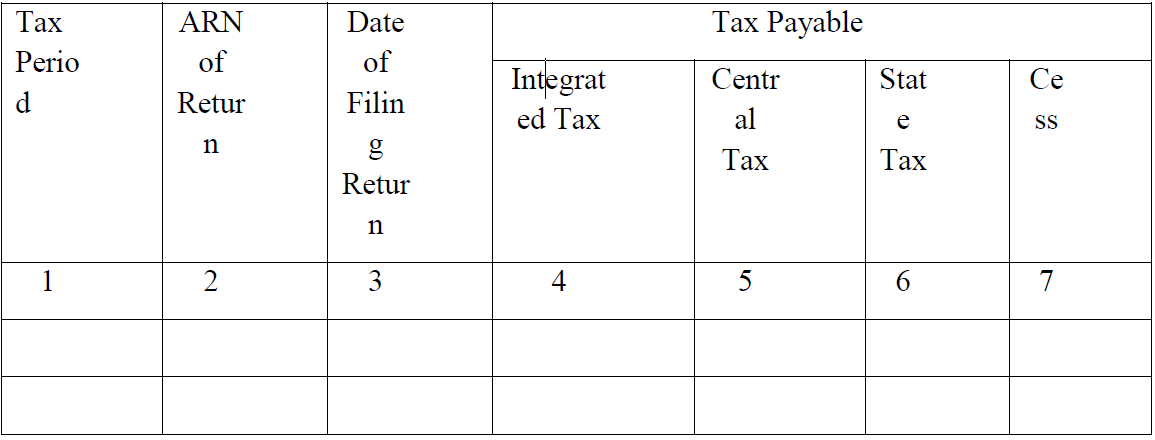
5.4 It appears that Statement -7 is designed for excess payment of tax made in a particular return. It has been reported by some tax administrations that this restricts a taxpayer from filing the claim of refund under the category ‘Excess Payment of Tax’ for any amount of excess payment of tax which is not relatable to a particular return period or that of excess payment of interest, penalty or late fee. However, it is possible that excess payment may happen under various circumstances some of which are illustrated below:
a) Excess payment can be detected at the time of reconciliation of accounts and it might be relatable to multiple return periods without clearly being attributable to any particular return.
b) Excess payment may be made through FORM GST DRC-03, FORM GST DRC-07 andFORM GST CMP-08.
5.5 In such cases, it is being reported that a taxpayer cannot claim refund under the category “Excess Payment of Tax” as the related particulars cannot be furnished in Statement-7 of FORM GST RFD-01 and they end up claiming the same under the category “Any Other”.
5.6 However, circumstances under which refunds can be claimed under the category “Any Other” is clarified in the circulars issued in this regard and the same are specific in nature which do not cover this condition.
5.7 Furthermore, though sub-section (8) of section 54 provides for refund of excess payment of tax and interest, if any, or any other amount paid, statement as required in terms of clause (k)of sub-rule (2) of Rule 89 restricts the same to tax only necessitating alignment of the same withthe aforesaid sub-section.
5.8 In view of the above, Law Committee, in its meeting held on 14.06.2023 &15.06.2023 deliberated on this issue and recommended that clause (k) of sub-rule (2) of Rule 89 may be amended (shown in red colour), as below. Further, Statement 7 in FORM GST RFD 01 may also be amended to incorporate the said rule change.

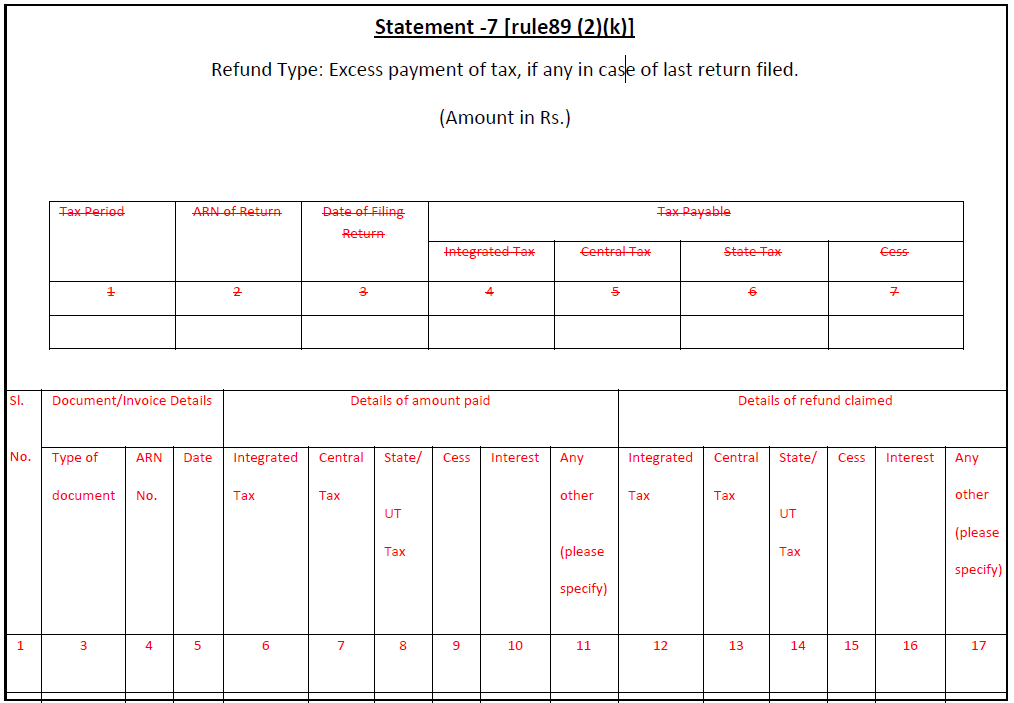
VI. Amendment in Rule 96(2):
6.1 Rule 96 of the CGST Rules, 2017 prescribes the manner of processing of Refund of integrated tax paid on goods [or services] exported out of India. Sub-rule (2) of rule 96 prescribes the process of transmission of export data from common portal to system designated by the Customs for further processing of the said refund application.
6.2 1st Proviso to Rule 96(2) provides that where the date for furnishing the details of outward supplies in FORM GSTR-1 for a tax period has been extended in exercise of the powers conferred under section 37 of CGST Act, 2017, the supplier shall furnish the information relating to exports as specified in Table 6A of FORM GSTR-1 after the return in FORM GSTR-3B has been furnished and the same shall be transmitted electronically by the common portal to the system designated by the Customs. 2nd Proviso to Rule 96(2) of CGST Rules provides further that the information in Table 6A furnished under the first proviso shall be auto-drafted in FORM GSTR-1 for the said tax period.
6.3 It may be observed that the option to file the export details of Table 6A of FORM GSTR 1 separately was made available initially during the period when filing of FORM GSTR-1 was delayed on the portal and filing of FORM GSTR-1 was not mandatory before filing of return in FORM GSTR-3B. However, now concept of sequential filling of Return has been introduced. Section 37 & section 39 of CGST Act, 2017 have been amended vide Notification No. 18/2022–Central Tax dated 28th September, 2022 with effect from 01 October, 2022. According to section 37(4) of CGST Act, 2017, a taxpayer shall not be allowed to file FORM GSTR-1 if previous FORM GSTR-1 is not filed and as per section 39(10) of the said Act, a taxpayer shall not be allowed to file return in FORM GSTR-3B if FORM GSTR-1 for the same tax period has not been filed.
6.4 Hence, Law Committee observed that 1st and 2nd proviso to sub-rule (2) of rule 96 do not serve any purpose now after the said amendments in CGST Act and hence have become redundant. Accordingly, the Law Committee in its meeting dated 10.04.2023 and 11.04.2023 recommended omission (shown in red colour) of Proviso 1 and Proviso 2 to rule 96(2) of CGST Rules, as below:
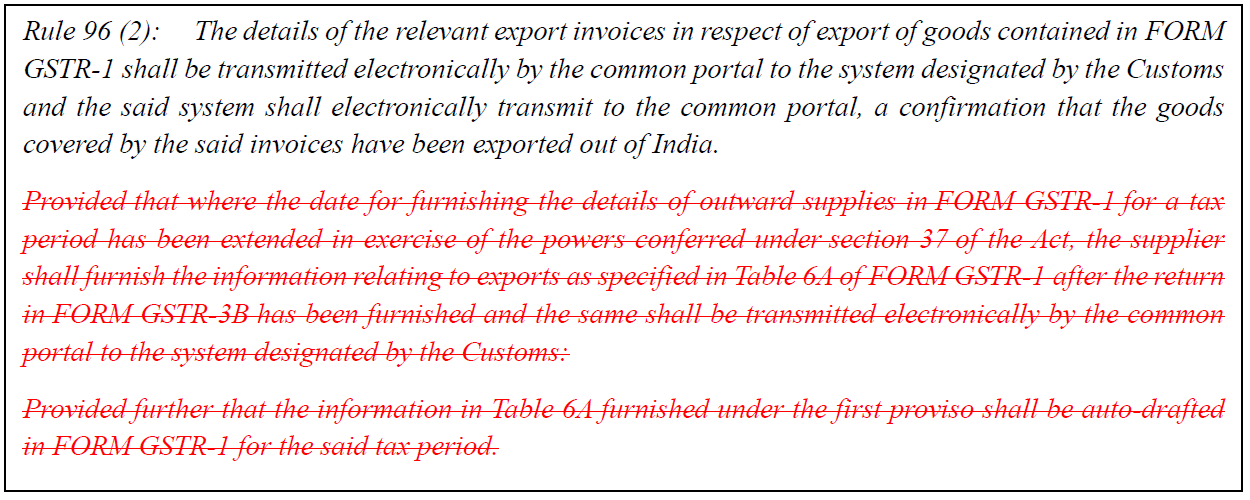
VII. Amendment in rule 108 and rule 109
7.1 In terms of sub-section (1) of section 107 of the CGST Act, 2017, any person aggrieved by any decision or order passed by an adjudicating authority may appeal to the concerned appellate authority within three months from the date of communication of the said decision or order to such person. Similar provision exists under sub-section (2) of section 107 of CGST Act to provide for filing appeal by an officer authorised by the Commissioner to the appellate authority within six months from the date of communication of the said decision or order.
7.2 In terms of sub-rule (1) of rule 108 of the CGST Rules, a doubt emerges whether an appeal under section 107 can be filed either electronically or manually, at the liberty of the Appellant. The aforesaid formulation has remained un-amended since the inception of GST in 2017. This was the time when the functionalities relating to registration, returns, payments and refunds had been rolled out on the common portal and the other processes/functionalities like Appeal, Advance Ruling, Scrutiny, etc. were still being developed. Thus, it was felt that, for instance, where the filing of an Appeal becomes necessary, an alternative mechanism as notified by the Commissioner may also be provided.
7.3 The issue was deliberated by the Law Committee in its meeting held on 10th/ 11th April, 2023, 31.05.2023 and 28.06.2023. The Law Committee noted that the rule provides mainly for filing of appeals, electronically, on the portal. Only in the cases where the Commissioner so notifies, the appeal can be filed in a mode other than electronically on the portal. However, as some of the Courts are taking a view that as per the present wording of rule 108 of CGST Rules, manual filing of appeals may also be considered as a default route of filing appeal under section 107 of CGST Act, there may be a requirement of the amendment in rule 108 and rule 109 of CGST Rules to provide clearly under what circumstances manual appeals may be filed under section 107 of CGST Act.
7.4 The Law Committee accordingly recommended amendment in rule 108 and rule 109 of CGST Rules (amendment shown in red color) by inserting a proviso in both of the said rules for filing appeal manually in certain specified circumstances.
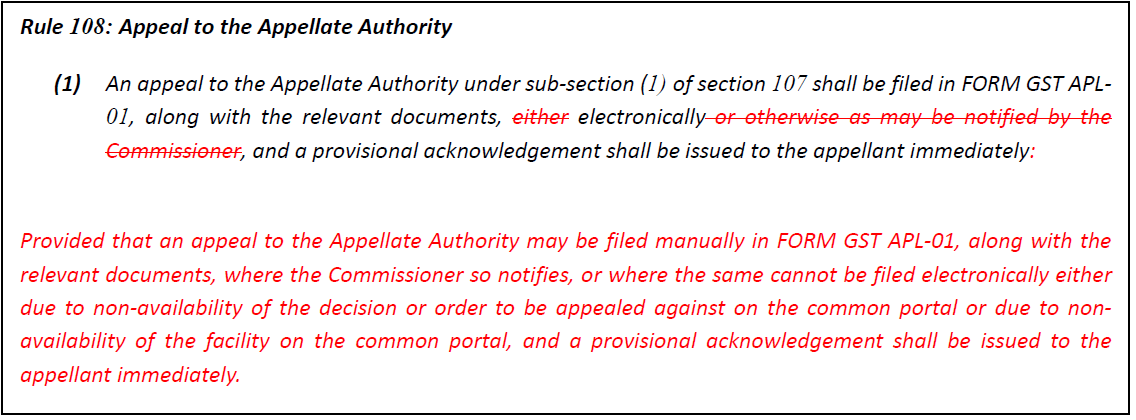
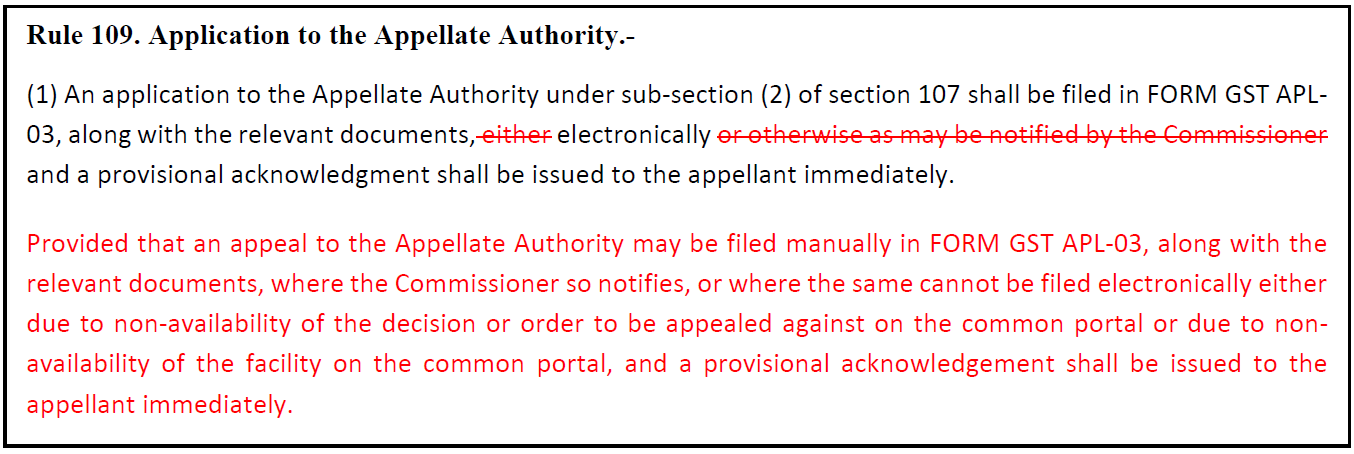
VIII. GSTR-3A notice for non-filing of Annual Return in FORM GSTR-9 or FORM GSTR-9A:
8.1 Section 46 of the CGST Act, 2017 read with Rule 68 of CGST Rules, 2017 requires issuance of a notice in FORM GSTR-3A to a registered person who fails to furnish return under Section 39 or Section 44 or Section 45 or Section 52 requiring him to furnish such return within fifteen days.
8.2 While FORM GSTR-3A has provision to issue notice to return defaulter as well as defaulters of final return, there is no provision in it to issue notice to defaulters of Annual returns.
8.3 In view of the same, the Law Committee in its meetings held on 15.03.2023, 10.04.2023 and 11.04.2023 recommended suitable amendment in FORM GSTR-3A (highlighted in red) for issuance of notice to the registered taxpayer for their failure to furnish Annual Return in FORM GSTR-9 or FORM GSTR-9A.
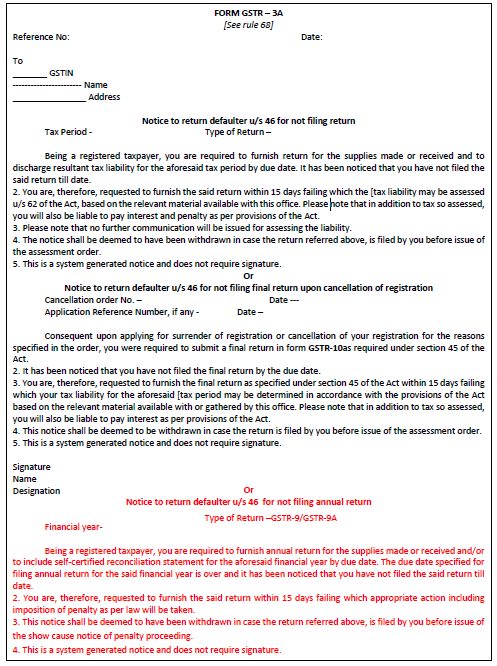
9. Accordingly, the agenda note is placed before the GST Council for deliberation and approval. Pari-Materia changes would also be required in the respective SGST Rules.
**********
Agenda Item 3(xviii): Proposal to provide a special procedure to file appeal against the orders passed in accordance with the Circular No. 182/14/2022-GST, dated 10.11.2022, pursuant to the directions issued by the Hon’ble Supreme Court in the Union of India v/s Filco Trade Centre Pvt. Ltd – regarding.
The Hon’ble Supreme Court in the Union of India v/s Filco Trade Centre Pvt. Ltd., SLP(C) No.32709-32710/2018 had directed that the common portal be opened for filing prescribed forms for availing Transitional Credit through TRAN-1 and TRAN-2 for two months from 01.10.2022 to 30.11.2022 for the aggrieved registered persons. In this regard, reference is also invited to Circular No. 180/12/2022 dated 09.09.2022 vide which guidelines have been issued for the applicants for filing new TRAN-1/TRAN-2 or revising the already filed TRAN-1/TRAN-2 on the common portal, and to Circular No. 182/14/2022-GST dated the 10th of November, 2022 prescribing guidelines to the officers for verifying the Transitional Credit and pass orders accordingly.
2. In light of this, it has been brought to the notice that though several taxpayers, or the Department, intend to file appeal against the orders issued by the proper officers in respect of such claims of transitional credit filed by the registered persons in accordance with the above mentioned directions issued by Hon’ble Supreme Court, there is presently no functionality available on the portal for enabling them to file such appeals. In some cases, time limit for filing appeals under provisions of section 107 of CGST Act, 2017 has already expired or is going to expire shortly.
3. Law Committee in its meetings held on 03.05.2023, 14/15.06.2023 and 28.06.2023 deliberated on the issue and recommended to provide a special procedure for filing of appeals manually against the orders passed in accordance with Circular No. 182/14/2022-GST dated the 10th of November, 2022. A draft notification providing the special procedure to be followed by a person desirous of filing an appeal against an order passed by the proper officer in accordance with Circular No. 182/14/2022-GST, dated10th of November, 2022 pursuant to the directions issued by the Hon’ble Supreme Court in the Union of India v/s Filco Trade Centre Pvt. Ltd., SLP(C) No.32709-32710/2018, as recommended by the Law Committee is enclosed with this agenda note as Annexure-A.
4. Accordingly, the recommendations of the Law Committee as detailed in para 3 is placed before the GST Council for approval.
ANNEXURE A
[TO BE PUBLISHED IN THE GAZETTE OF INDIA, EXTRAORDINARY, PART II, SECTION 3, SUB-SECTION (i)]
GOVERNMENT OF INDIA MINISTRY OF FINANCE (DEPARTMENT OF REVENUE) CENTRAL BOARD OF INDIRECT TAXES AND CUSTOMS NOTIFICATION No. /2023 – CENTRALTAX
New Delhi, the —- June, 2023
S.O.(E).— In exercise of the powers conferred by section 148 of the Central Goods and Services Tax Act,2017 (12 of 2017) (hereinafter referred to as the said Act), the Central Government, on the recommendations of the Council, hereby notifies the following special procedure to be followed by a registered person (hereinafter referred to as “the said person”) desirous of filing an appeal against an order (hereinafter referred to as “the said order”) passed by the proper officer in accordance with Circular No. 182/14/2022-GST, dated 10th of November, 2022 pursuant to the directions issued by the Hon’ble Supreme Court in the Union of India v/s Filco Trade Centre Pvt. Ltd., SLP(C) No.32709-32710/2018.
Explanation. – For the purposes of this notification, the expression “said person” shall include the officer referred to in sub-section (2) of Section 107.
2. The appeal against the said order shall be made in duplicate in the Form appended to this notification at ANNEXURE-1 and shall be presented manually before the Appellate Authority within the time specified in sub-section (1) of Section 107 or sub-section (2) of Section 107, as the case may be, and such time shall be computed from the date of issuance of this notification or the date of the said order, whichever is later:
Provided that any appeal against the said order filed in accordance with the provisions of Section 107 with the Appellate Authority before the issuance of this notification, shall be deemed to have been filed in accordance with this notification.
3. The said person shall not be required to deposit any amount as referred to in sub-section (6) of Section 107 as a pre-condition for filing an appeal against the said order.
4. An appeal filed under this notification shall be accompanied by relevant documents including a self-certified copy of the said order. Further, the appeal and the relevant documents shall be signed by the person specified in sub-rule (2) of rule 26 of CGST Rules.
5. Upon receipt of the appeal referred to in para 4, duly verified in the manner provided above and accompanied by the relevant documents, an acknowledgement, indicating the appeal number, shall be issued manually in FORM GST APL-02 by the Appellate Authority or an officer authorized by him in this behalf and the appeal shall be treated as filed only when the aforesaid acknowledgement is issued.
6. The Appellate Authority shall, along with its order, issue a summary of the order in the Form appended to this notification as ANNEXURE-2.
Name Designation
ANNEXURE-1
Appeal to Appellate Authority
(Filed against an order passed in accordance with Circular No. 182/14/2022-GST, dated 10th of November, 2022 pursuant to the directions issued by the Hon’ble Supreme Court in the Union of India v/s Filco Trade Centre Pvt. Ltd., SLP(C) No.32709-32710/2018)
1. GSTIN– 2. Legal name of the appellant –
3. Trade name, if any –
4. Address –
5. Order No. – Order dated –
6. Designation of the officer passing the order appealed against –
7. Date of communication of the order appealed against –
8. Name of the authorized representative –
9. Details of the case under dispute –
(i) Brief issue of the case under dispute –
(ii) Amount of transitional credit claimed before the issuance of circular no. 182/14/2022-GST, dated 10th of November, 2022 (Act-wise)–
(iii) Details of any order u/s 73/74 passed in respect of the claim referred to in sub-item (ii) above:
(a) Order No. – Order dated-
(b) Amount allowed as per said order (Act-wise)- Rs.
(c) Interest and penalty levied as per said order (Act-wise)- Rs.
(d) Whether any appeal preferred against said order- Yes/No
(e) If appeal filed then Appeal No.- Appeal Date-
(f) Status of said Appeal- Disposed/Pending
(g) If appeal disposed off then amount of credit allowed as per said Appeal (Act-wise)- Rs.
(iv) Amount of transitional credit claimed after the issuance of circular no. 182/14/2022-GST, dated 10th of November, 2022 (Act-wise)–
(v) Amount of credit allowed in pursuance of claim referred to in sub-item (iii) above (Act-wise)- Rs.
(vi) Amount under dispute (Act-wise)- Rs.
10. Whether the appellant wishes to be heard in person – Yes / No
11. Statement of facts:
12. Grounds of appeal:
13. Prayer:
Verification
I, < _________________________ >, hereby solemnly affirm and declare that the information given here in above is true and correct to the best of my knowledge and belief and nothing has been concealed therefrom.
Place: Date:
Signature Name of the Applicant
Note:
1. If the space provided for answering any item is found to be insufficient, separate sheets may be used.
2. The letters “N.A.” may be recorded against any item that is not required for this Appeal.
ANNEXURE-2
SUMMARY OF TRANSITIONAL CREDIT AVAILABLE AFTER ISSUE OF ORDER BY THE APPELLATE AUTHORITY WITH REFERENCE TO AN ORDER PASSED IN ACCORDANCE WITH CIRCULAR NO. 182/14/2022-GST, DATED 10th of NOVEMBER, 2022
A. GSTIN –
B. Name of the Appellant/ person-
Address of the appellant/person –
C. Order appeal against- Ref. (if any) Dated-
E. Personal Hearing- Dated-
F. Order in Brief-
G. Status of Order- Confirmed/Modified/Rejected
H. Amount of Credit/ Demand after Appeal-

Place: Date:
Signature: Name of the Appellate Authority: Designation: Jurisdiction
Agenda Item 3(xix): Issues pertaining to ISD mechanism and taxability of services provided by one distinct person to another distinct person.
A taxpayer with multiple branch offices often procures the input services from a third party at Headquarters or at one office, for and on behalf of the other offices. Such taxpayers can then adopt various mechanisms to transfer the ITC pertaining to such input services to the said offices.
1.Input Service Distributor Mechanism:
1.1 An Input Service Distributor (ISD) is a taxpayer that receives invoices for input services used by its one or more branches. It distributes the Input Tax Credit (ITC), to such branches based on a specified mechanism by issuing ISD invoices. The branches can have different GSTINs but must have the same PAN as that of ISD. Section 2(61) of CGST Act, 2017 defines ISD as under:
“2(61) “Input Service Distributor” means an office of the supplier of goods or services or both which receives tax invoices issued under section 31 towards the receipt of input services and issues a prescribed document for the purposes of distributing the credit of central tax, State tax, integrated tax or Union territory tax paid on the said services to a supplier of taxable goods or services or both having the same Permanent Account Number as that of the said office;” 1.2 Further section 20 of CGST Act, 2017 provides for manner of distribution of credit by Input Service Distributor to its branch offices. Section 20 is reproduced below:
“20. Manner of distribution of credit by Input Service Distributor.— (1) The Input Service Distributor shall distribute the credit of central tax as central tax or integrated tax and integrated tax as integrated tax or central tax, by way of issue of a document containing the amount of input tax credit being distributed in such manner as may be prescribed.
(2) The Input Service Distributor may distribute the credit subject to the following conditions, namely:––
(a) the credit can be distributed to the recipients of credit against a document containing such details as may be prescribed;
(b) the amount of the credit distributed shall not exceed the amount of credit available for distribution;
(c) the credit of tax paid on input services attributable to a recipient of credit shall be distributed only to that recipient;
(d) the credit of tax paid on input services attributable to more than one recipient of credit shall be distributed amongst such recipients to whom the input service is attributable and such distribution shall be pro rata on the basis of the turnover in a State or turnover in a Union territory of such recipient, during the relevant period, to the aggregate of the turnover of all such recipients to whom such input service is attributable and which are operational in the current year, during the said relevant period;
(e) the credit of tax paid on input services attributable to all recipients of credit shall be distributed amongst such recipients and such distribution shall be pro rata on the basis of the turnover in a State or turnover in a Union territory of such recipient, during the relevant period, to the aggregate of the turnover of all recipients and which are operational in the current year, during the said relevant period.
Explanation.––For the purposes of this section,––
(a) the “relevant period” shall be––
(i) if the recipients of credit have turnover in their States or Union territories in the financial year preceding the year during which credit is to be distributed, the said financial year; or (ii) if some or all recipients of the credit do not have any turnover in their States or Union territories in the financial year preceding the year during which the credit is to be distributed, the last quarter for which details of such turnover of all the recipients are available, previous to the month during which credit is to be distributed;
(b) the expression “recipient of credit” means the supplier of goods or services or both having the same Permanent Account Number as that of the Input Service Distributor; (c)the term ‘‘turnover’’, in relation to any registered person engaged in the supply of taxable goods as well as goods not taxable under this Act, means the value of turnover, reduced by the amount of any duty or tax levied under entries 84 and 92 A of List I of the Seventh Schedule to the Constitution and entries 51 and 54 of List II of the said Schedule.”
2. Mechanism whereby head office raises invoice under section 31 to the branch office without registering as ISD
2.1 Another mechanism that may be followed by a Head Office (HO) of a business entity in cases of input services procured by Head Office (HO) from a third party for or on behalf of one or more branch offices is that the HO can avail ITC on input services procured from a third party for or on behalf of one or more branch offices and then raises an invoice under section 31 of CGST Act to the Branch Office (BO), to which such input services are attributable, and the said BO can then claim ITC in respect of such input services. This mechanism does not require the HO to take registration under the ISD provision of the CGST Act, 2017.
2.2 It is pertinent to note that Explanation to section 16(2)(b) of CGST Act which was brought into effect from 01.02.2019 vide The Central Goods and Services Tax (Amendment) Act, 2018 (No. 31 of 2018) provides that in case of services, the registered person shall be deemed to have received the services where the services are delivered by the supplier to any person on the direction and on account of the said registered person. The said Explanation is reproduced below: “16. Eligibility and conditions for taking input tax credit.—
………
(2) Notwithstanding anything contained in this section, no registered person shall be entitled to the credit of any input tax in respect of any supply of goods or services or both to him unless,––
……….
(b) he has received the goods or services or both.
Explanation.— For the purposes of this clause, it shall be deemed that the registered person has received the goods or, as the case may be, services––
(i) where the goods are delivered by the supplier to a recipient or any other person on the direction of such registered person, whether acting as an agent or otherwise, before or during movement of goods,either by way of transfer of documents of title to goods or otherwise;
(ii) where the services are provided by the supplier to any person on the direction of and on account of such registered person;”
2.3 As per the Notes on Clauses of the Central Goods and Services Tax (Amendment) Act, 2018, the intention of the said amendment was to provide for input tax credit in cases of “Bill-to-ship-to” model in the case of supply of services. In such cases, two different tax invoices are issued, i.e., by the seller to a registered person and by the said registered person to the ultimate recipient of service. The bill-to parties of both invoices will receive input tax credits. The overall impact of this transaction is that the ultimate recipient of service will receive the input tax credit for this supply.
2.4 Thus, as per the Explanation to section 16(2)(b) of CGST Act, in cases of input services procured by Head Office (HO) from a third party attributable to a Branch Office (BO), the HO can raise an invoice to BO to which such input services are attributable and the said BO can then claim ITC in respect of such input services.
3.Thus, various practices are being followed by the industry with respect to distribution of input tax credit by HO to branch offices in case of common input services received from third party which are attributable to one or more the BOs. Doubts have been raised by tax authorities as to whether is it mandatory for the HO to follow the Input Service Distributor(ISD) mechanism for distribution of ITC in respect of input services, procured by HO from a third party which are also attributable to one or more BOs or can the HO also follow the mechanism of raising invoice under section 31 to the branch office without registering as ISD and the said BO thereafter claiming ITC in respect of such input services. Some field formations are taking a view that ISD mechanism was mandatory for distribution of input tax credit in respect of input services received by HO attributable to HOs as well as BOs or by one or more BOs and HO was not allowed to pass on input tax credit in respect of third party input services through issuance of tax invoices under section 31 of CGST Act. Some advance rulings authorities have also taken similar view.
4.Tax ability and valuation w.r.t. to internally generated activities/services between distinct persons
4.1 The offices or establishments of an organisation, who have obtained registration in one State or in different States, are establishments of distinct persons under sub-section (4) of section 25 of the CGST Act and Explanation 1 of section 8 of the Integrated Goods and Services Tax Act, 2017. GST law envisages these distinct registered persons to be independent entities, though part of one legal entity, and they can be providing services to each other. As per Schedule I to CGST Act, supply of goods or services or both between related persons or between distinct persons as specified in section 25, when made in the course or furtherance of business, shall be treated as supply under CGST Act even if made without consideration. Thus, if HO is providing any services to its BOs or one BO is providing any services to other BOs, the same will be deemed as supply of services as per Schedule I of CGST Act, if the said services are provided in the course or furtherance of business, even if no consideration is charged for the said services.
4.2 In case HO is providing certain services, which are internally generated by HO, to BOs, the value of such supply of services made by a registered person to a related or distinct person cannot be determined in terms of provisions of sub-section (1) of section 15 of CGST Act and instead, needs to be determined as per rule 28 of CGST Rules, read with sub-section (4) of section 15 of CGST Act. As per clause (a) of rule 28, the value of supply of goods or services or both between distinct persons shall be the open market value of such supply. However, if the open market value is not available, the value of supply of goods or services or both between distinct persons shall be the value of supply of goods or services of like kind and quality as per clause (b) of rule 28. The second proviso to rule 28 of CGST Rules provides that where the recipient is eligible for full input tax credit, the value declared in the invoice shall be deemed to be the open market value of the goods or services. The said rule is reproduced below:
“28. Value of supply of goods or services or both between distinct or related persons, other than through an agent.-The value of the supply of goods or services or both between distinct persons as specified in sub-section (4) and (5) of section 25 or where the supplier and recipient are related, other than where the supply is made through an agent, shall-
(a) be the open market value of such supply;
(b) if the open market value is not available, be the value of supply of goods or services of like kind and quality;
(c) if the value is not determinable under clause (a) or (b), be the value as determined by the application of rule 30 or rule 31, in that order:
Provided that where the goods are intended for further supply as such by the recipient, the value shall, at the option of the supplier, be an amount equivalent to ninety percent of the price charged for the supply of goods of like kind and quality by the recipient to his customer not being a related person: Provided further that where the recipient is eligible for full input tax credit, the value declared in the invoice shall be deemed to be the open market value of the goods or services.”
5. Disputes are being raised regarding as to whether a particular activity being performed by HO for branch offices or by one BO for another BO can be treated as supply of services. Disputes are also arising regarding the valuation of such internally generated supply of services from one distinct person to another distinct person, including as to which cost component is required to be included while computing taxable value of such internally generated services, both in the cases where full input tax credit is available to the recipient, and also in cases where full input tax credit is not available to the recipient.
6. A draft Circular on the issue was deliberated in the 35th GST Council Meeting held on 21st June 2019 wherein the Council recommended for the Law Committee to re-examine the issue. Accordingly, the Law Committee deliberated on the issue its various meetings and took the following view:
7.1 For common input services procured from third party:
7.1.1 For past periods
7.1.1.1 ISD mechanism is applicable for distribution of input tax credit on input services where the headquarter or one office of a business entity is receiving invoices from the third parties in respect of the services which are attributable to one or more offices of the said entity. As discussed above, many taxpayers may have used methods other than ISD for passing on of input tax credit in respect of such supply of input services received from third parties, which is attributable to one or more of their other offices, i.e. distinct persons, as there was ambiguity and lack of clarity about the whether such distribution of credit is mandatorily required to be done through ISD mechanism or can be done by issuance of tax invoice by headquarters to other branches/ offices/ distinct persons. Rather, the two sectoral FAQs issued – one on IT & ITES and another on banking sector – clarify that ISD mechanism is not mandatory and taxpayer has option to issue invoice for passing on the credit. The relevant question in the FAQ on IT&ITES is reproduced below:
“Question 26: Is the requirement of transferring of credit through ISD mechanism mandatory? Answer: The ISD provision under the CGST Act, 2017 is not mandatory. It only provides the manner of distribution of ITC wherever the business entity wishes to distribute the ITC as an
Input Service Distributor.”
The relevant question in the FAQ on banking sector is as below:
“17. Would Input Tax Credit (ITC) be available to a GST registrant though the services procured from third party vendor are also directly used by various ‘distinct persons’? In such cases, is distribution of ITC required to be done mandatorily through Input Service Distributor mechanism?
Answer: Yes. Input Tax Credit (ITC) can be availed by a GST registrant in respect of the services procured in a consolidated manner from third party vendor which are directly used in the course or furtherance of business in more than one State, e.g. statutory audit fees, advertisement and marketing expenses, consultancy fees etc. The same needs to be appropriately invoiced or distributed through the ISD mechanism to the “distinct persons” who have actually used such services.”
7.1.1.2 Further, the present formulation of section 20 of CGST Act read with section 24 of CGST Act does not provide any indication that ISD mechanism is mandatory for passing on/ distribution of ITC in respect of input services procured by HO from a third party but attributable to both HO and BO or exclusively to one or more BOs.
7.1.1.3 Law Committee took a view that there is no intent in the present provision of CGST Act to make ISD mechanism mandatory, and accordingly, it may be clarified through a circular that it is not mandatory to follow ISD procedure laid down in Section 20 of CGST Act read with rule 39 of the Central Goods and Services Tax Rules, 2017 for distribution of ITC in respect of input services procured by HO from a third party but attributable to both HO and BO or exclusively to one or more BOs and that such credit can also be passed on by HO by issuing tax invoices under section 31 of CGST Act to the concerned BOs. In cases, where HO wants to distribute credit through ISD mechanism, it shall be required to get itself registered mandatorily as per provisions of section 24(viii) of CGST Act. Further, it may also be clarified that HO can distribute the ITC to a BO through ISD mechanism or can issue invoice under section 31 to a BO in respect of an input services received from a third party only if the said services are being supplied to the concerned BO.
7.1.2 For prospective periods
7.1.2.1 Law Committee took a view that ISD procedure, as laid down in Section 20 of CGST Act read with rule 39 of the CGST Rules, may be made mandatory prospectively for distribution of ITC in respect of input services procured by Head Office (HO) from a third party but attributable to both HO and Branch Office (BO) or exclusively to one or more BOs. Further, ITC on account of input services received from a third party, where such input services are liable to tax on reverse charge basis, should also be required to be distributed through ISD route. This will require amendment in law which the Law Committee may formulate in due course.
7.1.2.2 Further, Law Committee also took a view that the manner of distribution of ISD credit as provided in section 20 does not require amendment at present. However, alternate objective criteria may be explored in future, if deemed appropriate, after consultation with trade.
7.2 For internally generated services:
7.2.1 Business entities also often carry out certain common functions from HO, which may be in nature of supervisory/ stewardship/ managerial oversight/ financial functions, which the business entity deems as the core functions of the HO and not directly attributable to any BO. Accordingly, they may not be considering the said activities as supply of services to BOs and accordingly may not be issuing tax invoices in respect of such activities. Further, in cases where they are issuing invoices in respect of some internally generated services to BOs, they may not bet including the cost component of some elements such as salary of employees involved in providing said activities/functions while raising invoices to BOs. In a large number of cases, the field formations, during audit or investigations, are taking a view that HOs are providing supply of such services to BOs in respect of such functions/ activities and that HO should have raised tax invoices as per section 31 of CGST Act, and/ or should have included the cost of salary paid to such employees of HO in respect of said supply of services.
7.2.2 As per second proviso to rule 28 of CGST Rules, where the recipient is eligible for full input tax credit, the value declared in the invoice shall be deemed to be the open market value of the goods or services. Accordingly, in case where full input tax credit is available to BOs, the value declared on the invoice by HO to BO in respect of a supply of services shall be deemed to be the open market value of such services. The intent of the Council for insertion of the said proviso in rule 28 appeared to be to ease the burden of compliance on the business entities on such deemed supplies between various offices of a business entity, having same PAN but which are required to obtain different registrations in different states due to requirement of GST law. Raising any demand on a business entity on the basis that the HO or a BO of the said business entity has not raised a tax invoice in respect of any particular services to other BOs or has not included cost of any component of such services in the invoice, when the full input tax credit is available to the recipient, may be against the intention of the GST Council and against the provisions of the second proviso to rule 28 of CGST Rules.
7.2.3 In view of this, LC recommended to clarify through the Circular that in cases where full input tax credit is available to the recipient, the value of such supply of services declared in the invoice by HO to BOs may be deemed as open market value, irrespective of the fact whether cost of any particular component of such services, like employee cost etc., has not been included in the value of the services in the invoice, or not. It may be further clarified that in cases where full input tax credit is available to the recipient if the invoice is not issued with respect to any internally generated services by the HO to the BO, the value of such services may be deemed to be declared as Nil by HO to BO, and may be deemed as open market value in terms of second proviso to rule 28 of CGST Rules.
7.2.4 As regards the cases, where full input tax credit is not available to the recipient, Law Committee took a view that the issue of taxability and valuation of such supply of internally generated services may be deliberated further.
8. Accordingly, Law Committee recommended issuance of a circular to clarify the issues as discussed in the above paras. The draft circular as recommended by the Law Committee is placed as Annexure A to this agenda note.
9. In-principle approval is also sought from the Council for the proposals mentioned at para 7.1.2 above.
10. Accordingly, the agenda along with draft Circular (Annexure-A) is placed before the Council for approval.
Annexure-A
Draft Circular
F.No.XX/XX/XXXX-GST Government of India Ministry of Finance Department of Revenue Central Board of Indirect Taxes and Customs GST Policy Wing
*****
North Block, New Delhi Dated XX, 2022
To,
The Principal Chief Commissioners / Chief Commissioners / Principal Commissioners / Commissioners of Central Tax (All) /
The Principal Directors General / Directors General (All)
Madam/Sir,
Subject: Clarification regarding taxability of services provided by an office of an organisation in one State to the office of that organisation in another State, both being distinct persons– reg.
Various representations have been received seeking clarification on the taxability of activities performed by an office of an organisation in one State to the office of that organisation in another State, which are regarded as distinct persons under section 25 of Central Goods and Services Tax Act, 2017 (hereinafter referred to as ‘the CGST Act’). The issues raised in the said representations have been examined and to ensure uniformity in the implementation of the law across the field formations, the Board, in exercise of its powers conferred under section 168(1) of the CGST Act hereby clarifies the issue in succeeding paras.
2. Let us consider a business entity which has Head Office (HO) located in State-1 and a branch offices (BOs) located in other States. The HO procures some input services e.g. security service for the entire organisation from a security agency (third party). HO also provides some other services on their own to branch offices (internally generated services).
3. The issues that may arise with regard to taxability of supply of services between distinct persons in terms of sub-section (4) of section 25 of the CGST Act are being clarified in the Table below: –

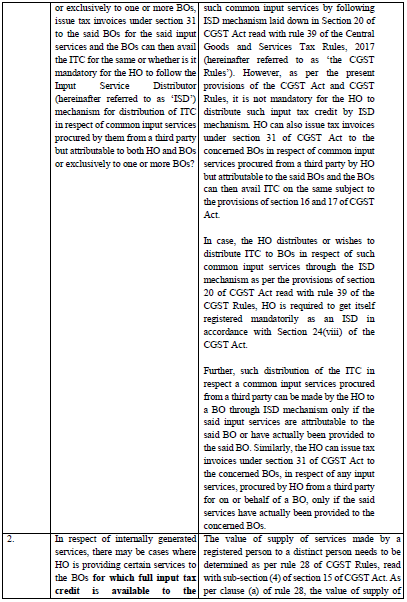
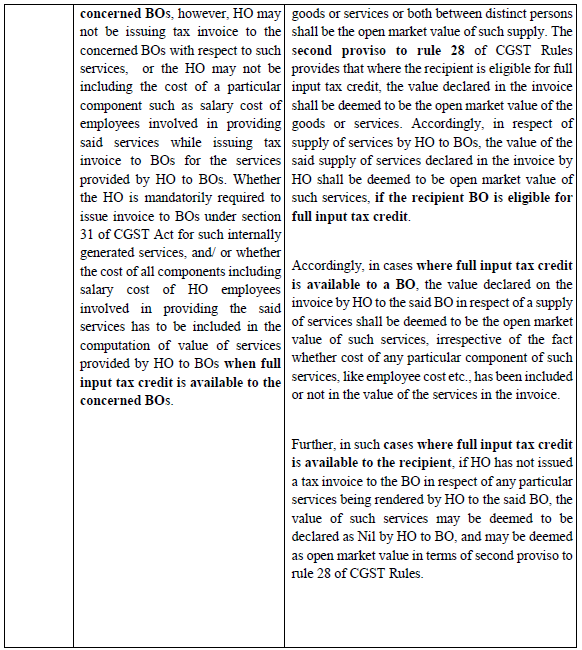
4. It is requested that suitable trade notices may be issued to publicize the contents of this circular.
5. Difficulty if any, in the implementation of this circular may be brought to the notice of the Board. Hindi version would follow.
(Sanjay Mangal) Principal Commissioner (GST)
Agenda Item 11: Addendum to Annexure-A of the Agenda item 11
In the table of Annexure A of Agenda Item 11 (at P-30 of Volume-II), Sl. No. 16 and 17 may be read as follows:
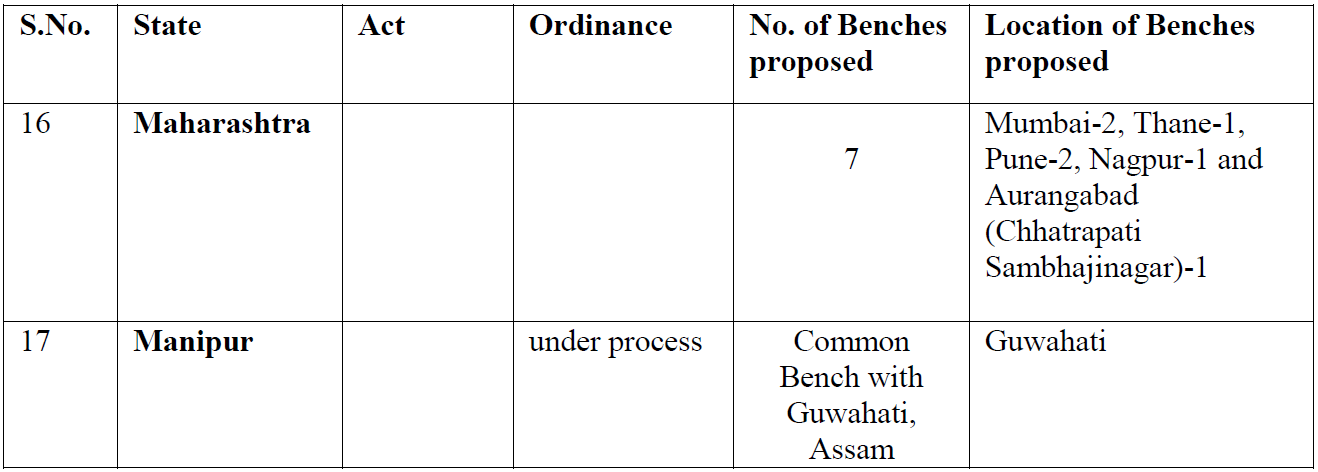
Agenda Item 13: Request for extension of due dates for filing GSTR-7, GSTR-1 & GSTR-3B for the months of April, May and June 2023 and extension of Amnesty Schemes in the State of Manipur
Request has been received from the CCT Manipur vide letter dated 03.07.2023 on the captioned subject. It has been stated that due to volatile law and order situation in the State, mobile data services and internet/ data service are under suspension in the State.
2. It may be noted that in view of the law and order situation in the State of Manipur, the due dates of filing FORM GSTR-1, GSTR-7 and GSTR-3B for the months of April and May 2023 for the registered persons of State of Manipur were extended earlier as below, as per recommendations of GST Implementation Committee (GIC):
(i) due dates of filing FORM GSTR-1, GSTR-7 and GSTR-3B for April, 2023 were first extended until 31.05.2023 vide notifications dated 24.05.2023; (ii) due dates of filing FORM GSTR-1, GSTR-7 and GSTR-3B for April and May, 2023 were thereafter extended until 30.06.2023 vide notifications dated 19.06.2023
3. It has now been requested by CCT, Manipur to extend the due dates of filing FORM GSTR-1, GSTR-7 and GSTR-3B for the months of April, May and June, 2023 till 31.07.2023 to provide relief to the registered persons in Manipur.
4. Moreover, the GST Council in its 49th meeting held on 18th February, 2023 had recommended certain amnesty measures which were notified on 31.03.2023 as under:
(i) Amnesty to GSTR-4 non-filers was provided vide Notification No. 02/2023-CT;
(ii) time limit for application for revocation of cancellation of registration was conditionally extended vide Notification No. 03/2023-CT;
(iii) Amnesty scheme for deemed withdrawal of assessment orders issued under Section 62 was provided vide Notification No. 06/2023-CT;
(iv) Amnesty to GSTR-9 non-filers was provided vide Notification No. 07/2023-CT;
(v) Amnesty to GSTR-10 non-filers was provided vide Notification No. 08/2023-CT;
5. It has now been requested by CCT, Manipur to extend the said Amnesty Schemes till 31.07.2023 in the State of Manipur as these amnesty schemes have come to an end on 30.06.2023.
6. The feasibility and readiness for implementation of these changes on the portal was sought from GSTN. GSTN, vide their mail dated 06.07.2023, has informed the following:
i) The due dates for filing of FORM GSTR-1, FORM GSTR-3B and FORM GSTR-7 for the tax persons registered in state of Manipur can be configured immediately on approval by the Council.
ii) For implementation of extension of the due dates of Amnesty schemes as mentioned in para 4 above, such extension of due dates of amnesty schemes on All India basis can be easily configurated on the system. However, for extending the due dates of Amnesty schemes only for State of Manipur, code level changes will be required to be done in the individual forms, which will take time to implement and which may not be feasible to be done by 31st July 2023.
7. It is also mentioned that representations have been received from some trade associations from other states also, who have sought for the extension of due dates of these Amnesty schemes beyond 30th June 2023.
8. Therefore, the agenda is placed before the Council for deliberation.
Agenda Item 14: Review of revenue position under Goods and Services Tax
1. The Figure below shows the trend and Table 1 shows the details of the collection in FY 2023-24 vis-à-vis FY 2022-23.
Figure 1: Monthly gross GST collection (in lakh crore)
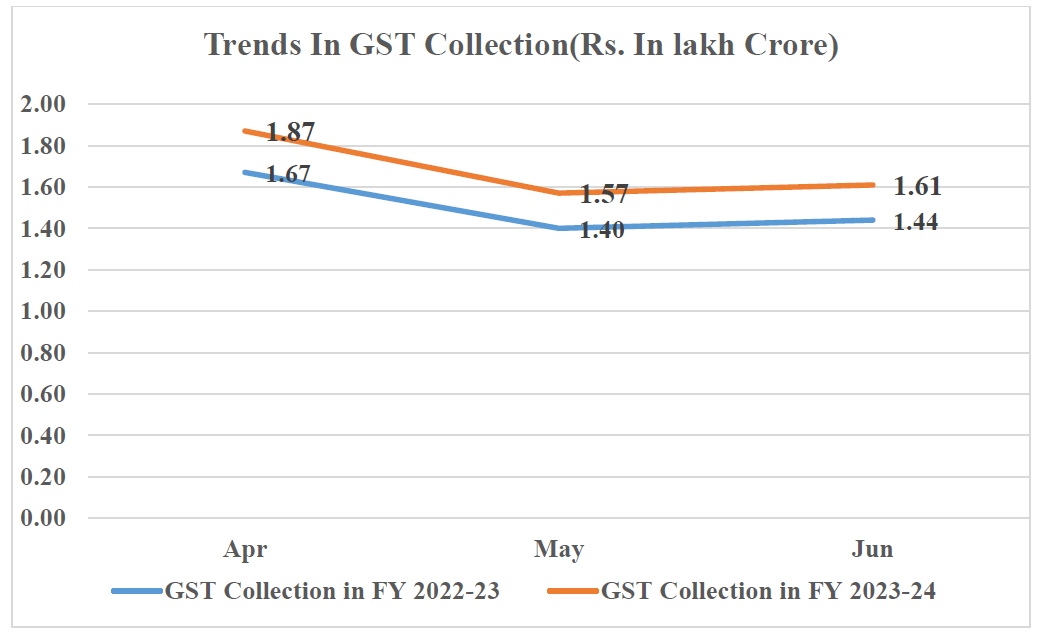
Table 1: Monthly gross GST collection (₹ crore)
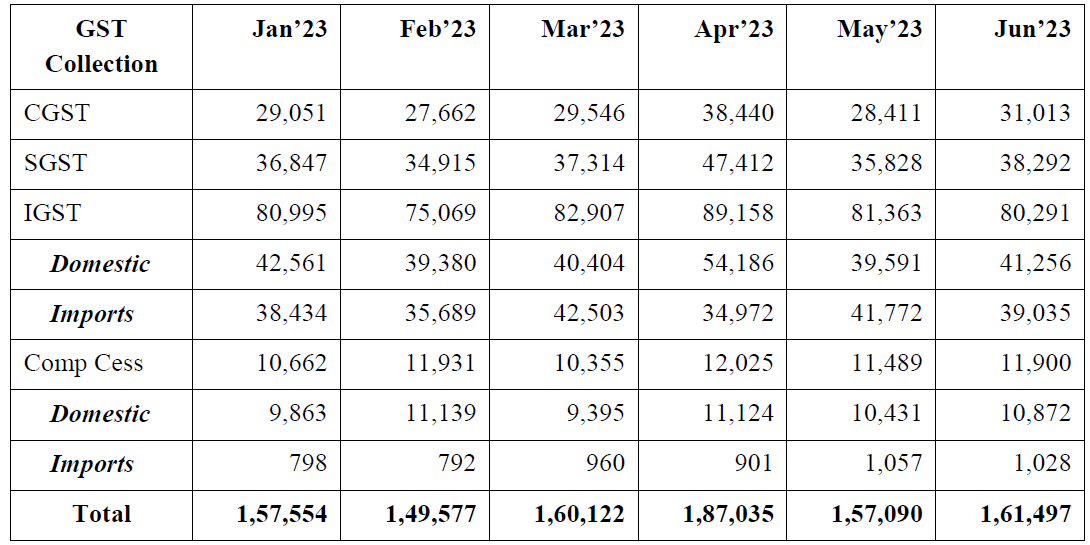
Table 2 shows the IGST collected, refunded, and settled/apportioned during FY 2023-24 till June, 2023.
Table 2: IGST Collection/Settlement/Apportionment/Refund in FY23-24
(Figures in Rs. Crore)
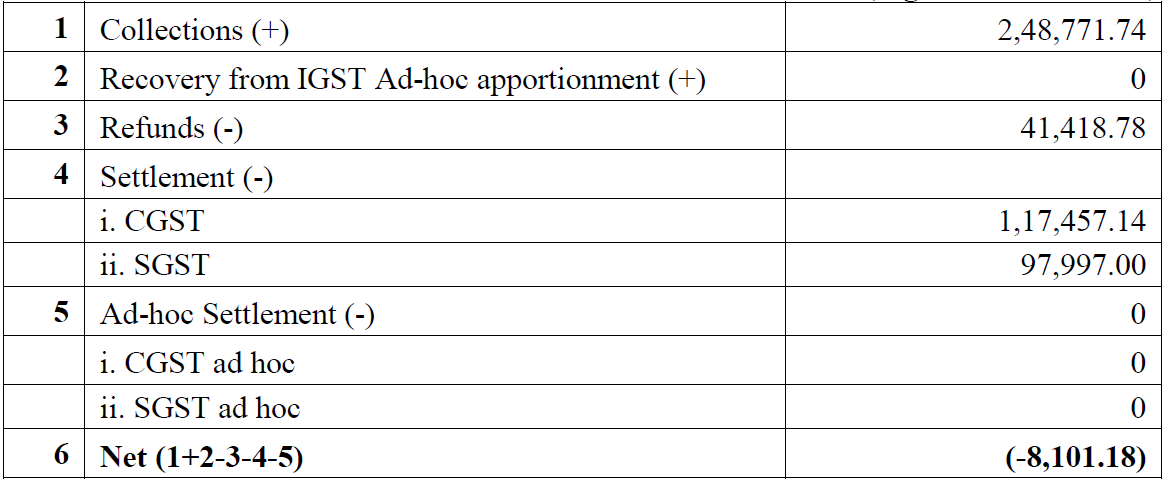
Source: PrCCA, CBIC
Compensation Fund
2. As per provision of GST (Compensation to States) Act, 2017 the Compensation Cess collected since implementation of GST w.e.f. 01.07.2017 till June, 2023 and the compensation released are shown in the table below:
Table 3: Compensation Cess collected and compensation released
(Figures in Rs. Crore)
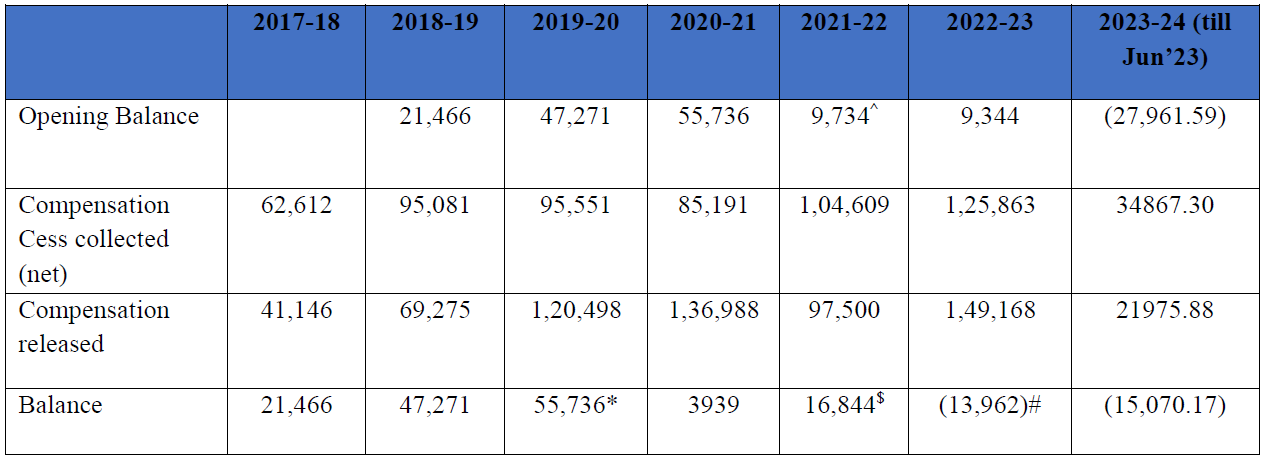
* Centre had transferred Rs. 33,412 crore from CFI to Compensation Cess Fund as part of an exercise to apportion balance IGST pertaining to FY 2017-18 on 01.06.2020.
^ Centre had transferred Rs. 5,795 crore from CFI to cess fund as part of an exercise to apportion balance IGST pertaining to 2018-19 on 08.03.2022
$ Balance GST compensation cess available is Rs. 16844 crore. However, taking into account the interest of back to back loan of Rs. 7,500 crore, GST compensation cess carried forward to FY 2022-23 as opening balance is Rs. 9344 crore.
# Balance GST compensation cess available is Rs. (-13,961.59) crore. However, taking into account the interest of back to back loan of Rs. 14,000 crore, GST compensation cess carried forward to FY 2023-24 as opening balance is Rs. -27,961.59 crore.
Table 4: Status of AG’s certificate received and processed:
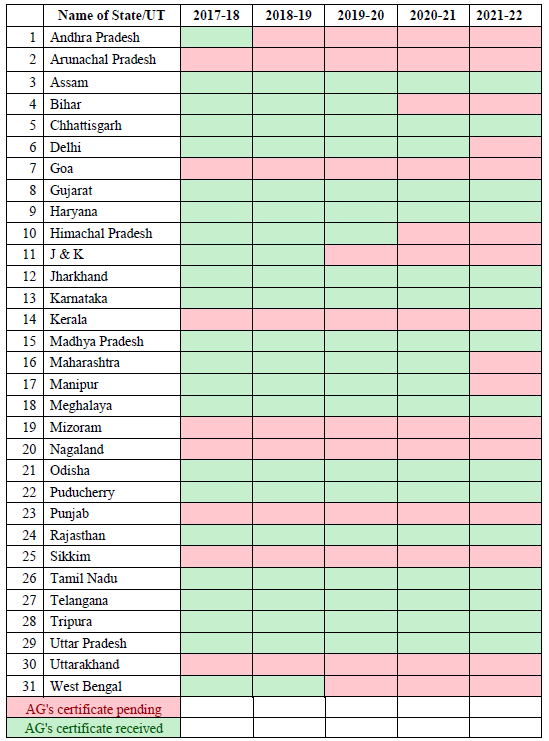
States Revenue Comparison
3. The State-wise details of comparison of SGST revenue and the post settlement SGST revenue (including ad-hoc settlement) for FY 2023-24 (April-June) as compared to FY 2022-23 (April-June) may be seen in the Table 5.
Table 5: State-wise Revenue Comparison Q1 (FY 2023-24) vs Q1 (FY 2022-23)
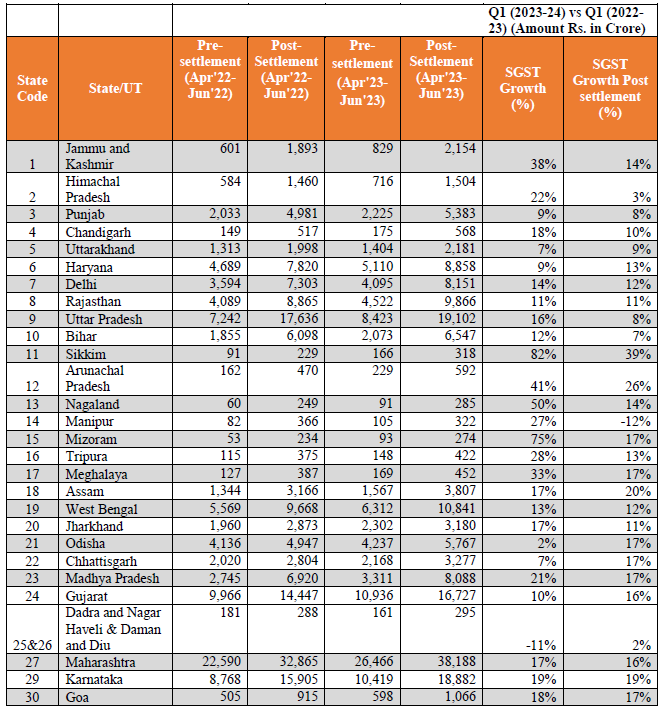

*Includes adhoc IGST settlement of Rs. 13,500 crore released to States in June’2022 Trends in Return filing
5. The table 6 shows the trend in return filing in FORM GSTR-3B and GSTR-1 till due date for return period Jan’23 to May’23. Tables 7 and 8 show the State wise filing for these months.
Table 6: Return filing (GSTR-3B/GSTR-1) till due date
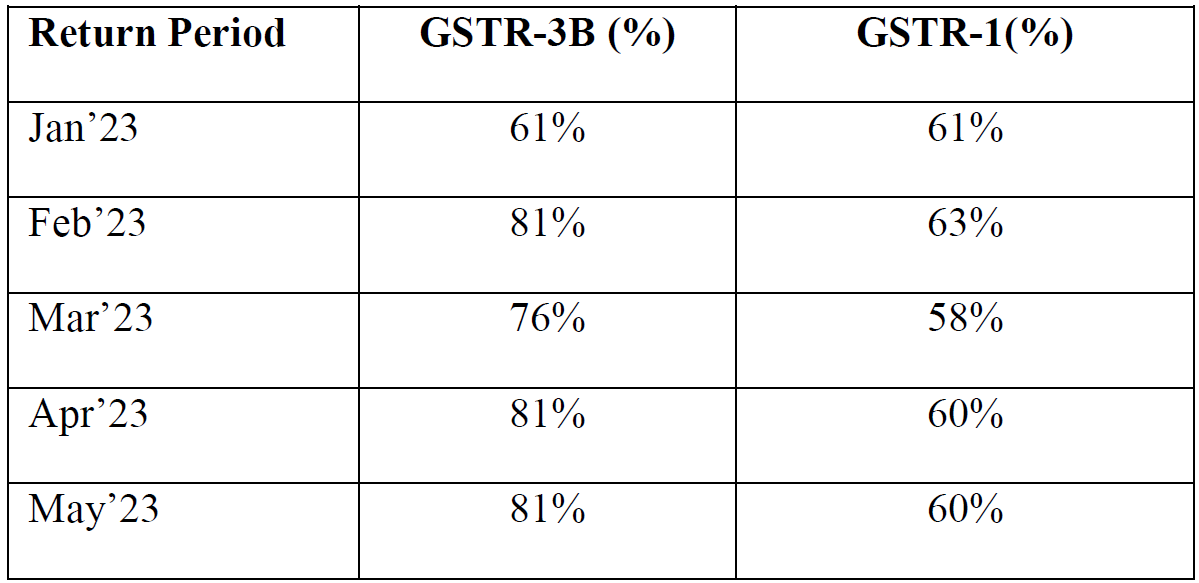
Figure 3: GSTR-3B/GSTR-1 Filing till due date
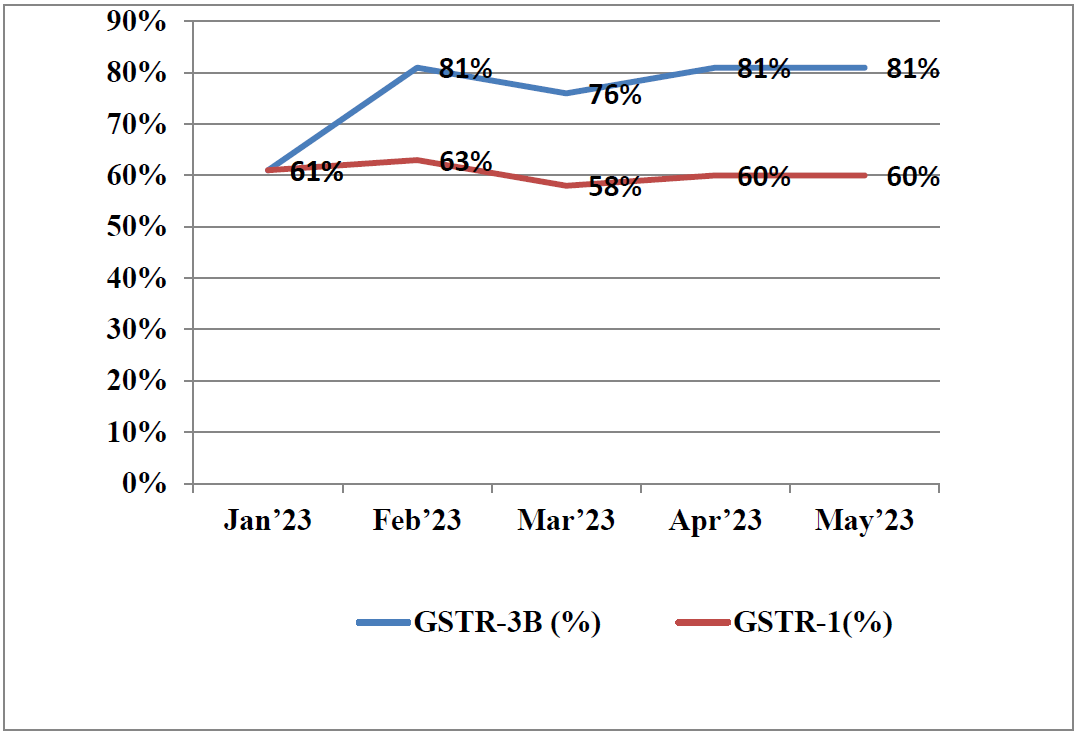
Table 7: State-wise Return filing (GSTR-3B) till due date (Jan’23-May’23)
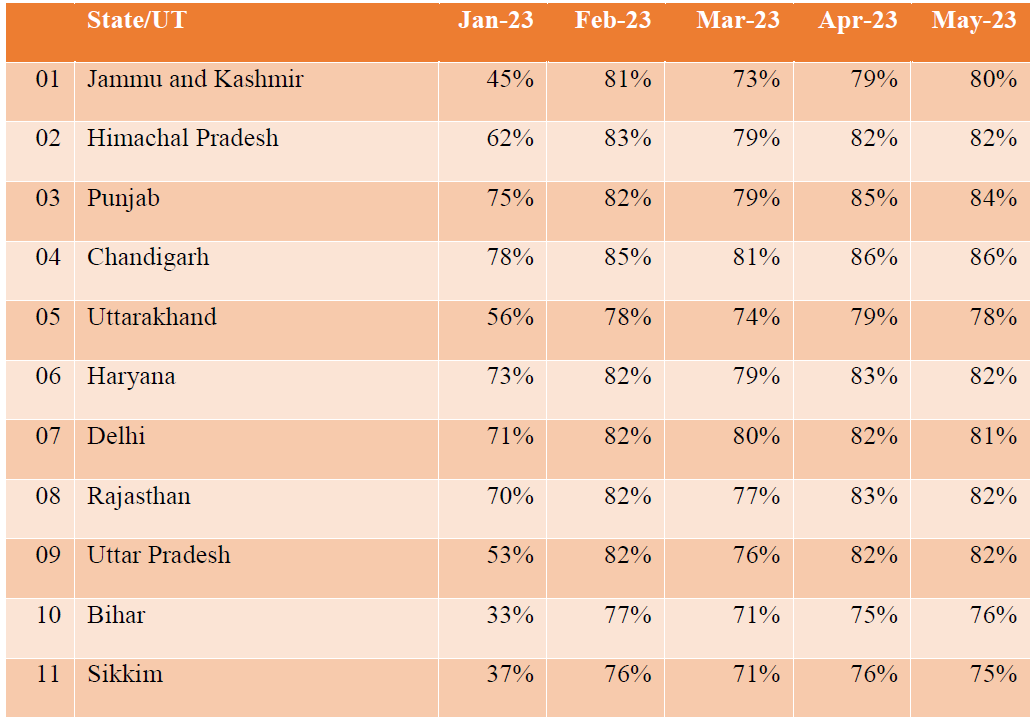
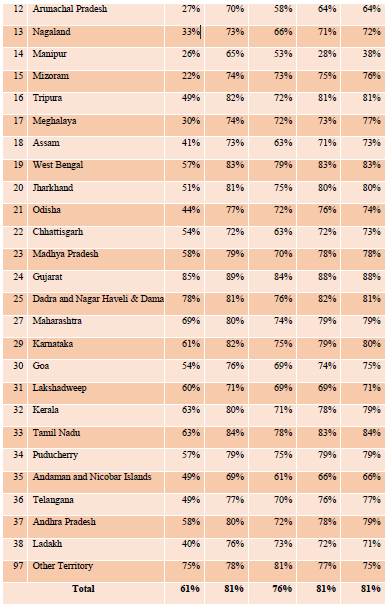
Table 8: State-wise Return filing (GSTR-1) till due date (Jan’23-May’23)
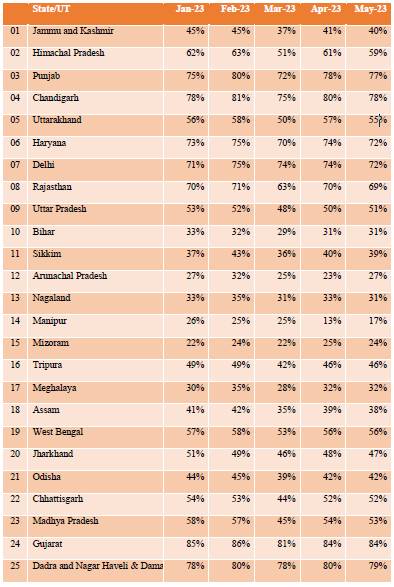
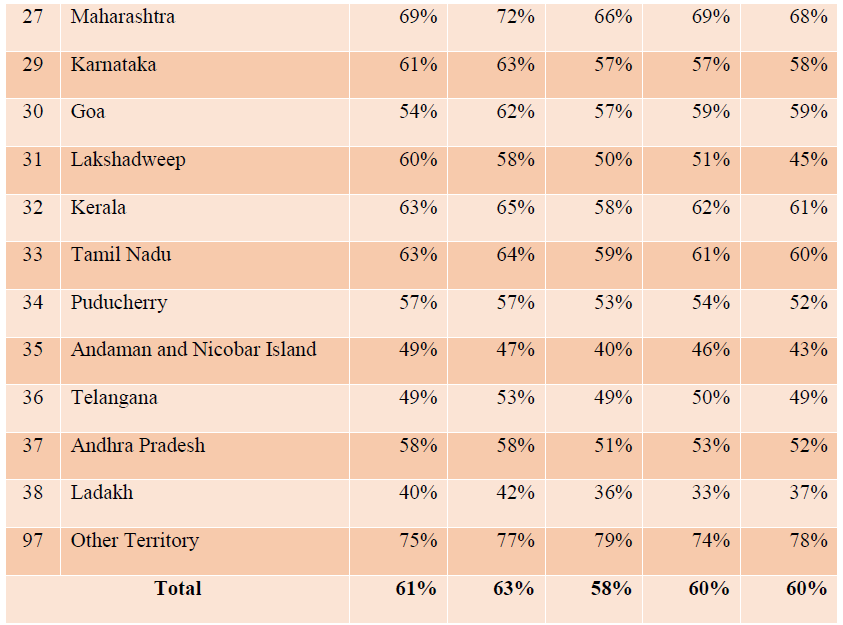
Agenda for the 50th GST Council Meeting
Recommendations of Fitment Committee on positive list of services to be specified in Sr. No. 3/3A of Notification No. 12/2017-CT(R)) dated 28.06.2017
The entries at Sr. No. 3 and 3 A of exemption Notification No. 12/2017-CT(R) dated 28.06.2017 exempt supply of pure services and composite supplies (goods component 25% or less) supplied to Central Government, State Government or Local Authority, by way of any activity in relation to Municipal or Panchayat functions under Article 243 G or 243 W of the Constitution
2. With effect from 1.1.2022, the entries read as below:
Entry 3 of Notification No. 12/2017- CT(R):
“Pure services (excluding works contract service or other composite supplies involving supply of any goods) provided to the Central Government, State Government or Union Territory or local authority by way of any activity in relation to any function entrusted to a Panchayat under Article 243G of the Constitution or in relation to any function entrusted to a Municipality under Article 243 W of the Constitution.”
Entry 3A of Notification No. 12/2017- CT(R):
“Composite supply of goods and services in which the value of supply of goods constitutes not more than 25 per cent. of the value of the said composite supply provided to the Central Government, State Government or Union territory or local authority by way of any activity in relation to any function entrusted to a Panchayat under Article 243G of the Constitution or in relation to any function entrusted to a Municipality under Article 243W of the Constitution.”
3. Prior to 1.1.2022, the exemption entries covered services supplied to Governmental authority and Governmental entities also.
4. There was a similar exemption in Service Tax initially. However, in view of disputes of interpretation and misuse , the exemption was restricted to supply of services by way of five specific activities, namely , water supply, public health, sanitation conservancy, solid waste management or slum improvement and up-gradation.
5. In view of the concern that the exemption is being interpreted too widely , a proposal to specify a positive list of services under the said entries was placed before the 45th GST Council meeting. The Council was of the view that while the approach to specify a positive list of exempt services was agreeable, the list recommended by Fitment Committee needs to be pruned and refined. It was agreed that the list of services shall be circulated to all states for their inputs for refining the list which may be brought before GST Council for approval.
6. Accordingly, as per the direction of the Council, the List was circulated to States. Comments were received from West Bengal, Bihar and Tamil Nadu. The issue was discussed at length in the Fitment Committee. After long deliberation the Fitment Committee was of the view that the exemption under said entries should confine to those services which are directly connected with the functions entrusted to Panchayat or Municipality and not services remotely or vaguely connected with those functions. Further, it was felt that only few services constitute bulk of input services by the local authority. Hence the list could be pruned down significantly while ensuring that major services by these bodies remain exempted. This approach would ensure that exemption entries are not interpreted widely, local authority continue to have major relief on supply of input services, and in respect of other general
services the normal design of GST could be applied. Fitment Committee also felt that in respect of purchase of goods no special concession is allowed to procurement by the Government or Local Authority. They suffer same incidence on goods as any private person (for example cement, iron and steel, vehicle, furniture etc.). In service, the special concession crept in as services were taxed differently in pre-GST regime wherein tax was only imposed by Centre and there was no VAT on services. However, In GST there should not be any appreciable difference in the approach for goods and services. As is the case in goods, the Government and Local Authority should also bear the normal rate of GST on input services barring exceptions. Accordingly, Fitment Committee carved out a positive list of services for consideration of the Council. The list contained the following 6 services :
1) Water treatment and/or supply
2) Public Health activities, Sanitation Conservancy and Solid or Liquid Waste management
3) Slum Improvement and Up gradation
4) Maintenance and operation of street lights, bus stops, public conveniences, public parks and gardens, burial ground and crematorium.
5) Renting of motor vehicles for carrying out functions listed at Sr. No. 1 to 4 above.
6) Supply of manpower services for carrying out functions listed at Sr. No 1 to 4 above.
7. With this positive List approach, it was also felt that the authorities constituted in different states for such civic work as fall in the proposed positive list should also be included in the ambit of these exemptions alongside the local authority. Accordingly , the exemption may also be extended to specified services supplied to Public Authorities which may be defined as under:
“Public Authority” means an authority or a board or any other body established by the Government to carry out the functions listed in S. No. 1 to 4 of the entry.
8. The recommendation of the Fitment Committee was discussed in the 47th GST Council meeting held on 28th -29th June, 2022. Since, some of the states expressed their concerns that the positive list of services should be more broad based, the Council directed that the proposal to specify a positive list of services under Sr. No. 3 & 3A of Notification No. 12/2017-Central Tax (Rate) dated 28.06.2017 may be reconsidered by the Fitment Committee taking into account the inputs from all the States which had voiced their concerns in the said council meeting.
9. Accordingly, the States of Telangana, Andhra Pradesh and Delhi were invited to the Fitment Committee meeting held on 12.09.2022 to give their views on the said issue. At the said meeting, Telangana requested to include Public Distribution System, Animal Husbandry etc. under the proposed positive list. Andhra Pradesh suggested expanding the proposed definition of Public Authority so as to cover manpower supply services hired by the state through a state corporation under exemption.
10. The views given by the states in writing were as under:
Telangana :
The following services may be added to the list of services to be specified in entry 3/3A of Notification No. 12/2017-Central Tax (Rate) dated 28.06.2017:
• Public Distribution and the related activities including Custom Milling and transportation services
Process of public distribution system involves large scale procurement of Custom Milling Services and renting of vehicles transportation services, without which the final goal of distribution cannot be met.
• Minor Irrigation
Telangana has taken up the programme of restoring the minor irrigation sources under the title “Mission Kakatiya”. The services procured under this programme areprimarily in the nature of pure services or services where goods component is less than 25%.
• Social forestry and Farm forestry
For achieving the objective of increasing tree cover in the State to 33% of the total geographical area of the State through the “Haritha haram”.
• Roads and bridges
To improve the connectivity, earth work (laying of mud roads) is taken up on a continuous basis in many villages. These services are generally procured from the Local people and the involvement of the goods component in these services is quite low.
Delhi
The exemption on services mentioned in Article 243 G & 243 W of Constitution of India should be continued.
11. In view of the above suggestions received from states, the Fitment Committee went through the list of activities specified in the 11th and 12th Schedule to the Constitution and recommended that the following services may be added to the positive list of services (placed before the 47th GST Council) under Sr. No. 3/3A of Notification No. 12/2017-CTR
• Education, including primary and secondary schools
• Technical training and vocational education
• Adult and non-formal education
• Libraries
• Social Forestry and Farm Forestry
• Fire Services
11.1 On the suggestion to include ‘society’ also in the definition of Public Authority, consensus was that the phrase ‘any other body’ used in the definition of Public Authority proposed in the 47th GST Council Meeting would include societies, companies, corporations etc. also.
11.2 As regards, the suggestion of Telangana to include Minor Irrigation & Roads and Bridges. GST on specified works contract services (WCS) supplied to Central Government, State Government and Local Authorities has recently been revised from 12% to 18% with effect from 18.07.2022 and on WCS predominantly involving earthwork from 5% to 12%. Services procured for minor irrigation and for construction/laying down of roads & bridges would predominantly be WCS which the GST Council has recommended to be taxed at 18%/12%.
11.3 Exempting custom milling will block the input tax credit (ITC) of the milling units on capital goods, raw materials (such as packing material, vitamins and other fortification additives etc.) and input services. GST payable on customs milling will in any case flow back to the Government as revenue.
12 Accordingly, after reconsidering the issue , the Fitment Committee recommended that (a) the following expanded list of 12 services may be specified in SI. No. 3 and 3A of Notification No. 12/2017-CTR as under:
“3. Supply of pure services, or composite supply of goods and services, in which the value of goods constitutes not more than 25% of the value of composite supply, to Central Government, State Government, Union Territory, a local authority or a public authority by way of
- Water treatment and/or supply;
2. Public Health activities, Sanitation Conservancy and Solid or Liquid Waste management;
3. Slum Improvement and Up gradation;
4. Maintenance and operation of street lights, bus stops, public conveniences,public parks and gardens, burial ground and crematorium;
5. Education, including primary and secondary schools;
6. Technical training and vocational education;
7. Adult and non-formal education;
8. Libraries;
9. Social Forestry and Farm Forestry;
10. Fire Services;
11. Renting of motor vehicles for carrying out functions listed at Sr. No. 1 to 10 above;
12. Supply of manpower services for carrying out functions listed at Sr. No 1 to 10 above.”
(b)Public authority may be defined as under:
“Public Authority means an authority or a board or any other body established and controlled by the Central or State Government to carry out the functions listed in SI. No. 1 to 10 of the entry.”
(c) As a consequential change to the proposed modification in entry 3 and 3A of the said Notification,an explanation may be inserted in the modified entry along the lines of the Circular No.177/09/2022-TRU dated 03rd August 2022 as under:
“Explanation: The exemption under this entry applies only to pure services and composite supplies procured by Central Government, State Government, Union Territories, local authorities or a public authority for performing functions listed in the 11th and 12th Schedule of the Constitution. Services procured by any Central/State Government Ministry/Department /Union Territory or Public Authority which does not perform any functions listed in the 11th and 12th Schedule, in the manner as a local authority does for the general public, are not eligible for exemption under this entry.”
13. The above recommendation of the Fitment Committee was discussed in the 48th GST Council meeting held via video conference . Some of the states including Tamil Nadur, Delhi, Kerala, Andhra Pradesh and west Bengal did not agree with the recommendation of the Fitment Committee. The Council decided to postpone discussion on the positive list of services in a physical meeting of the GST Council.
14. The recommendations of the Fitment Committee is placed before the GST Council for consideration.